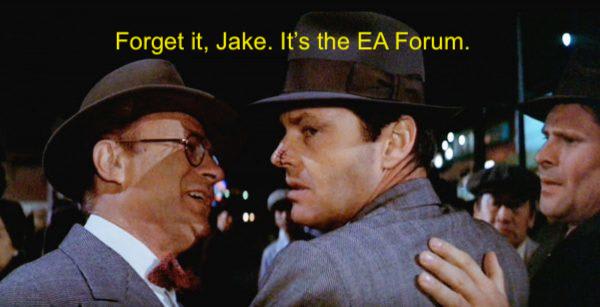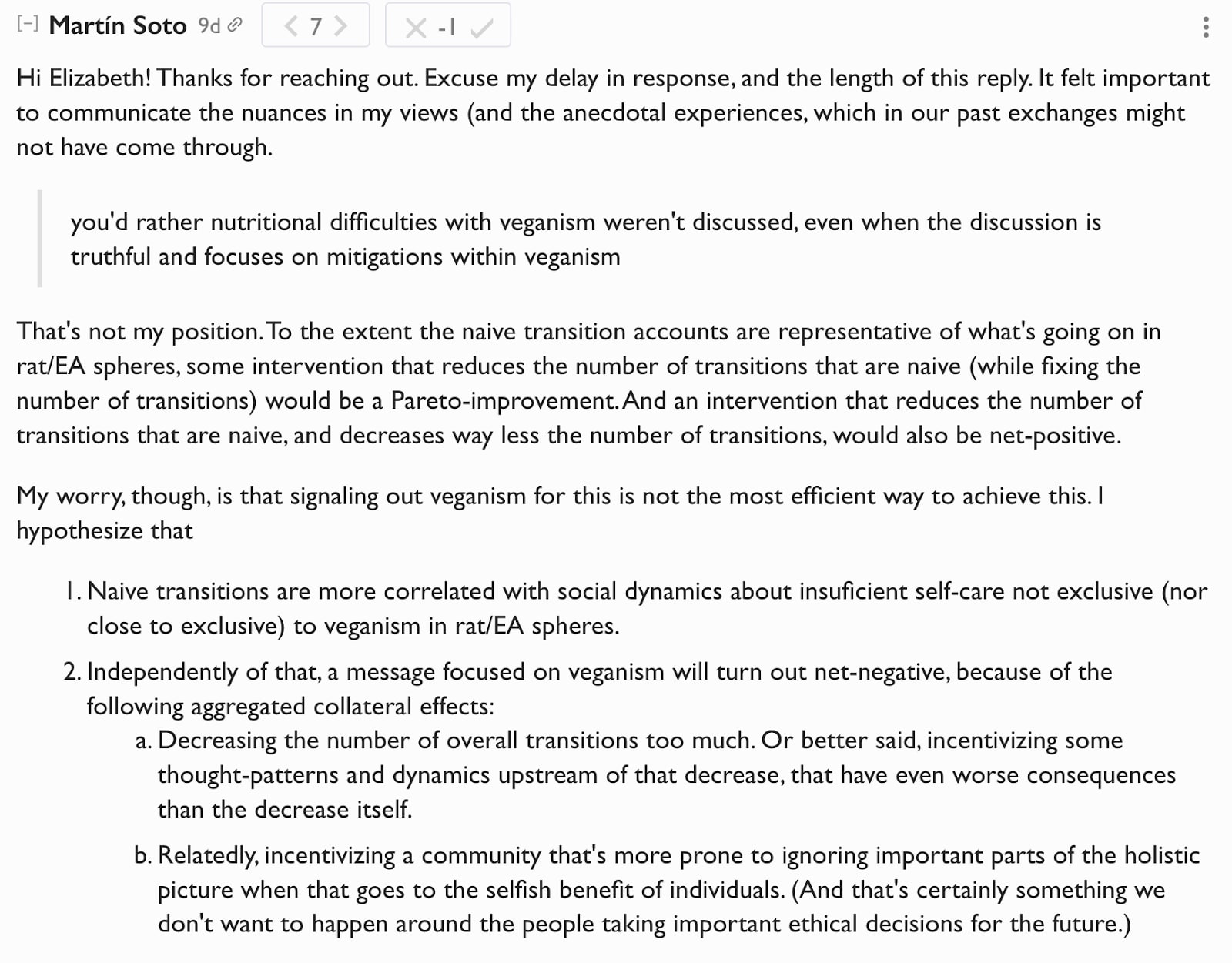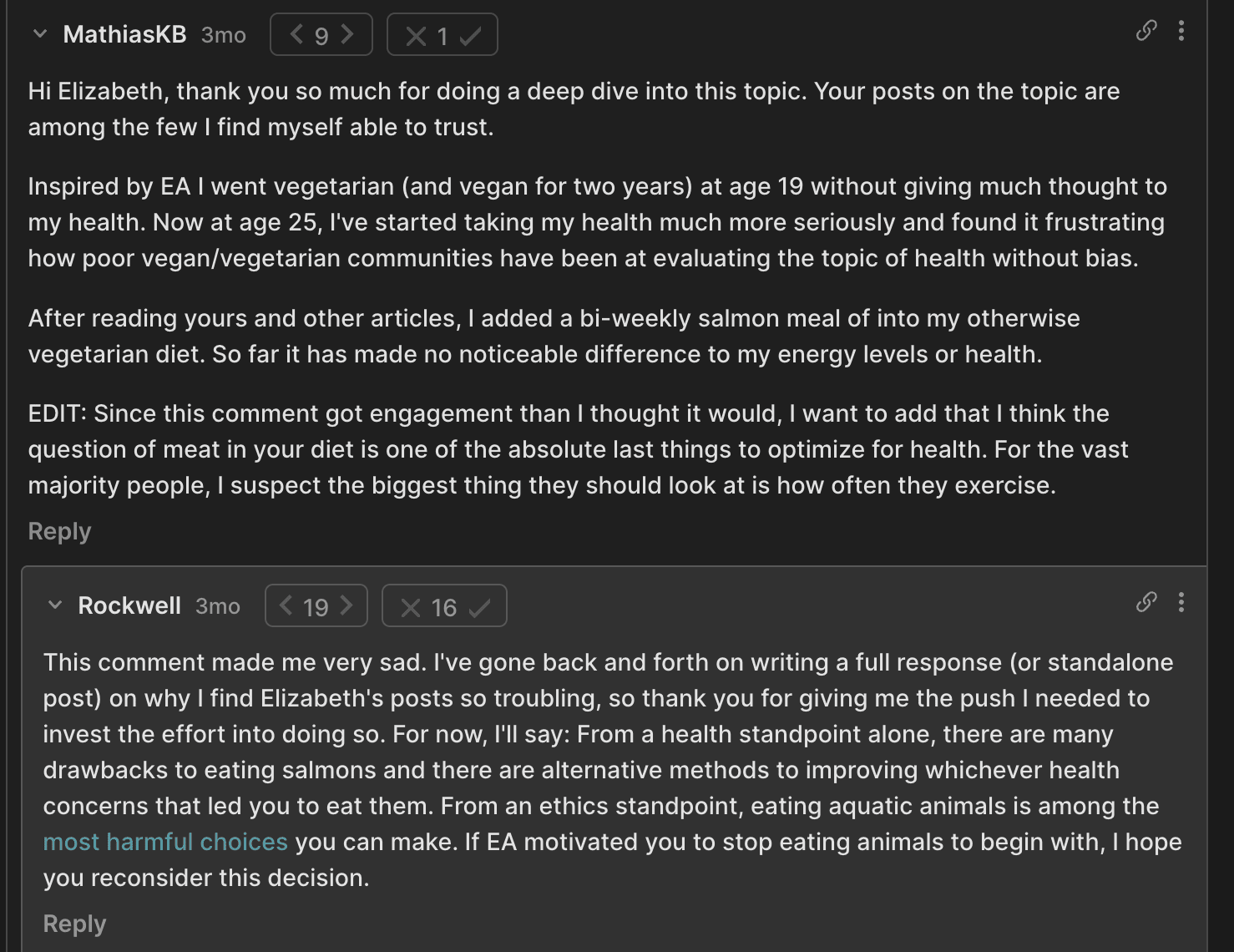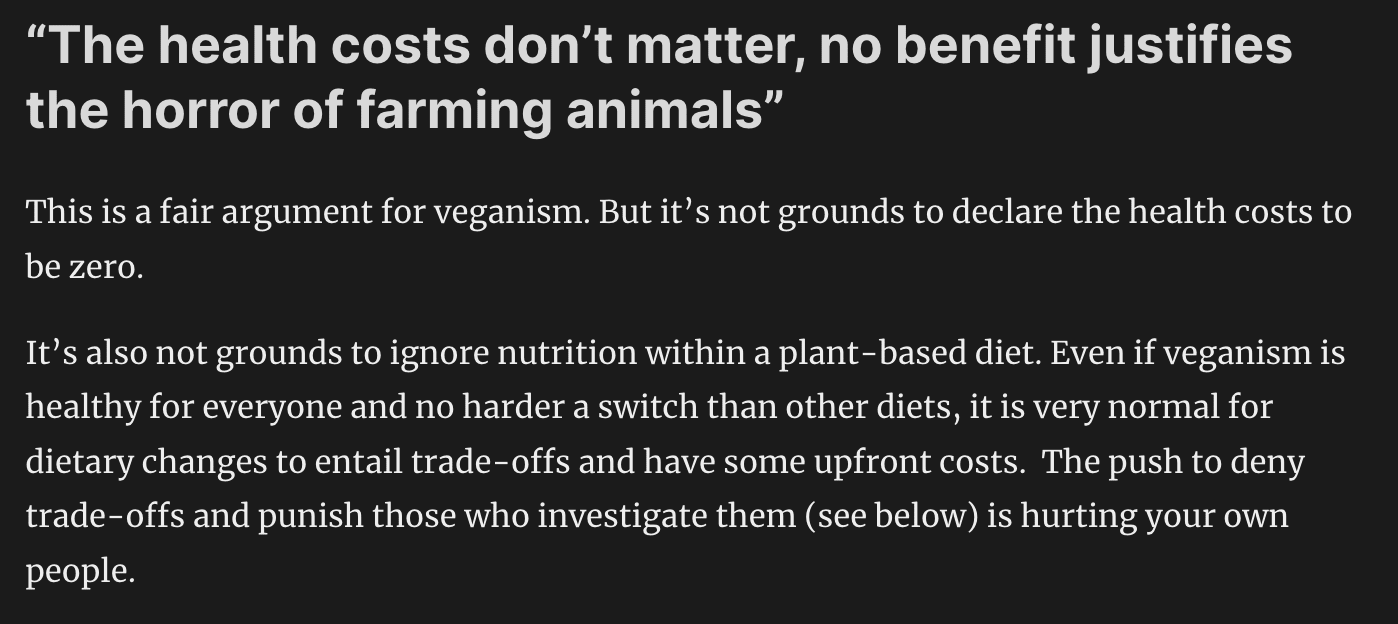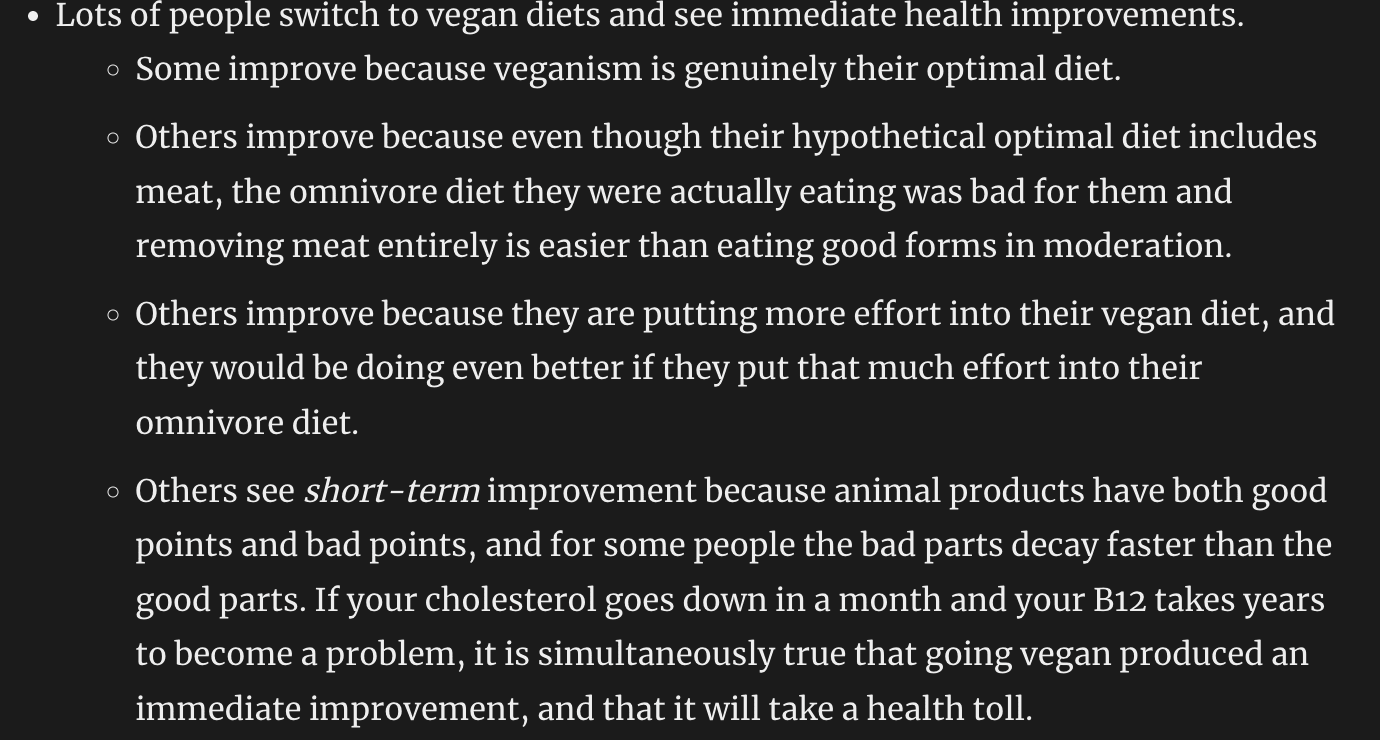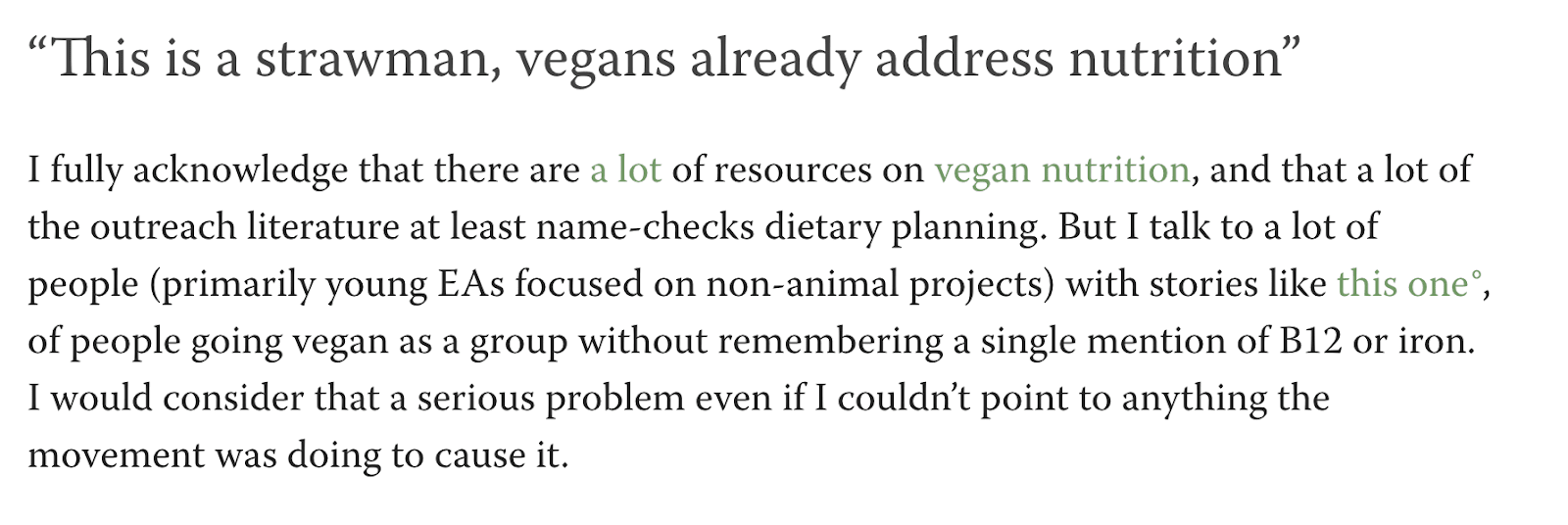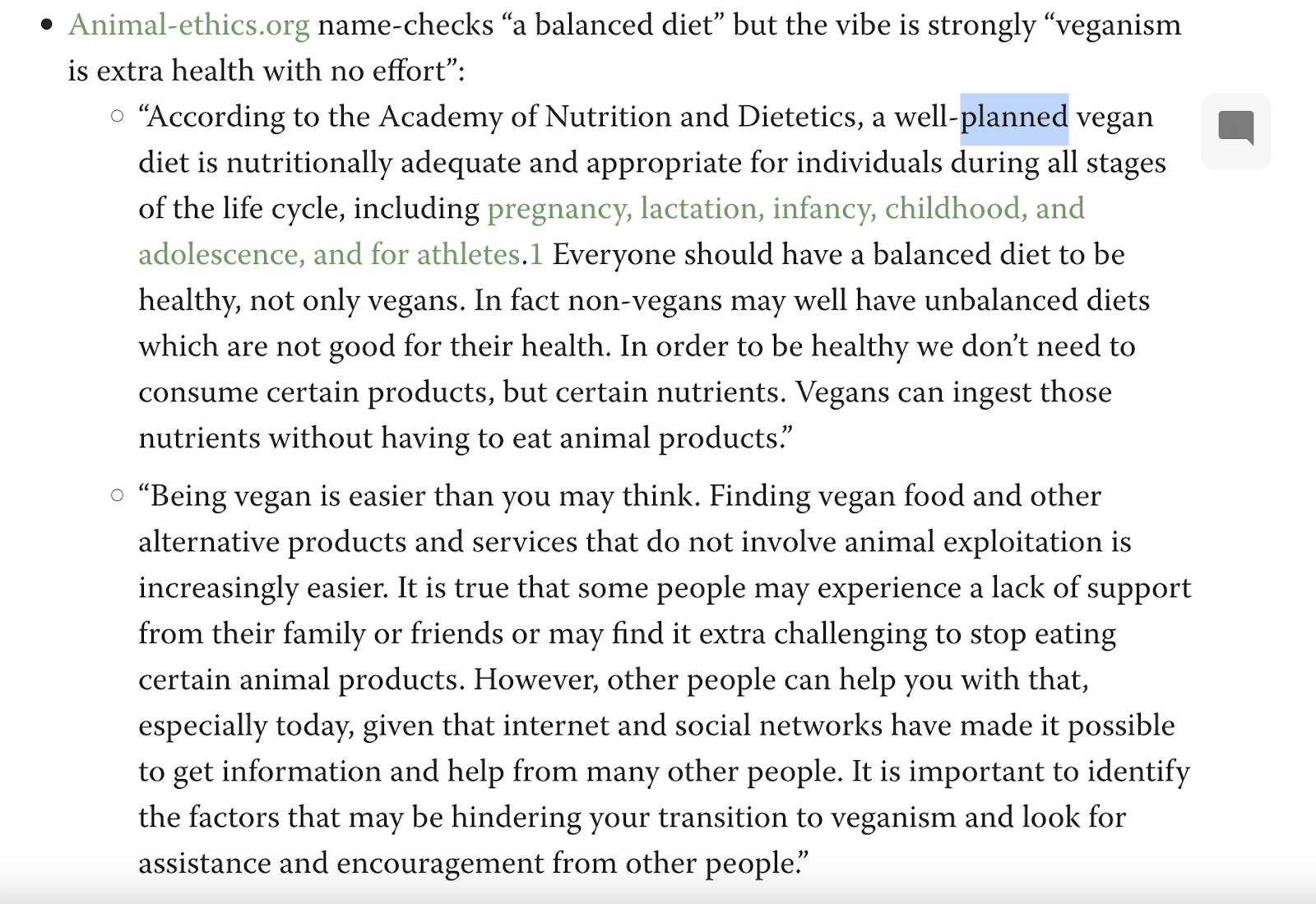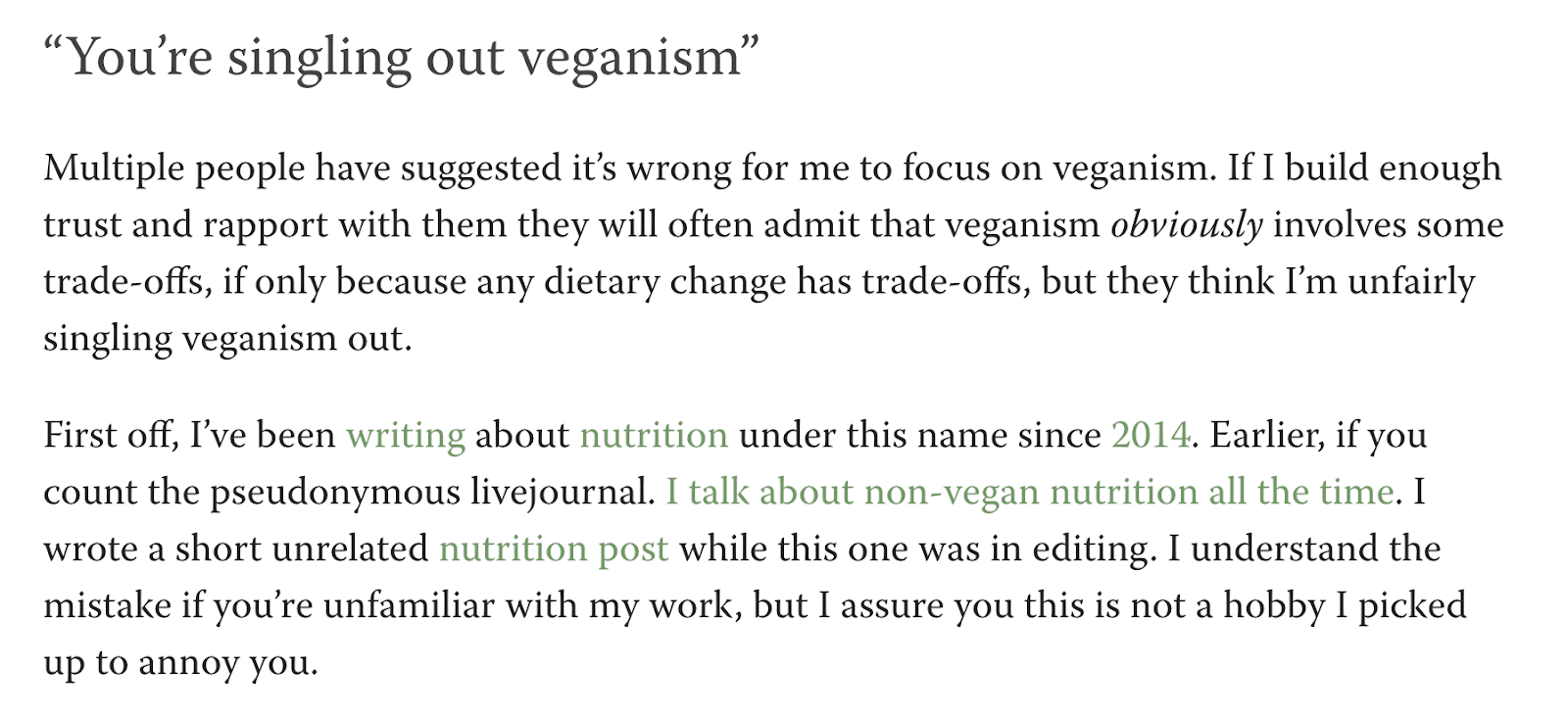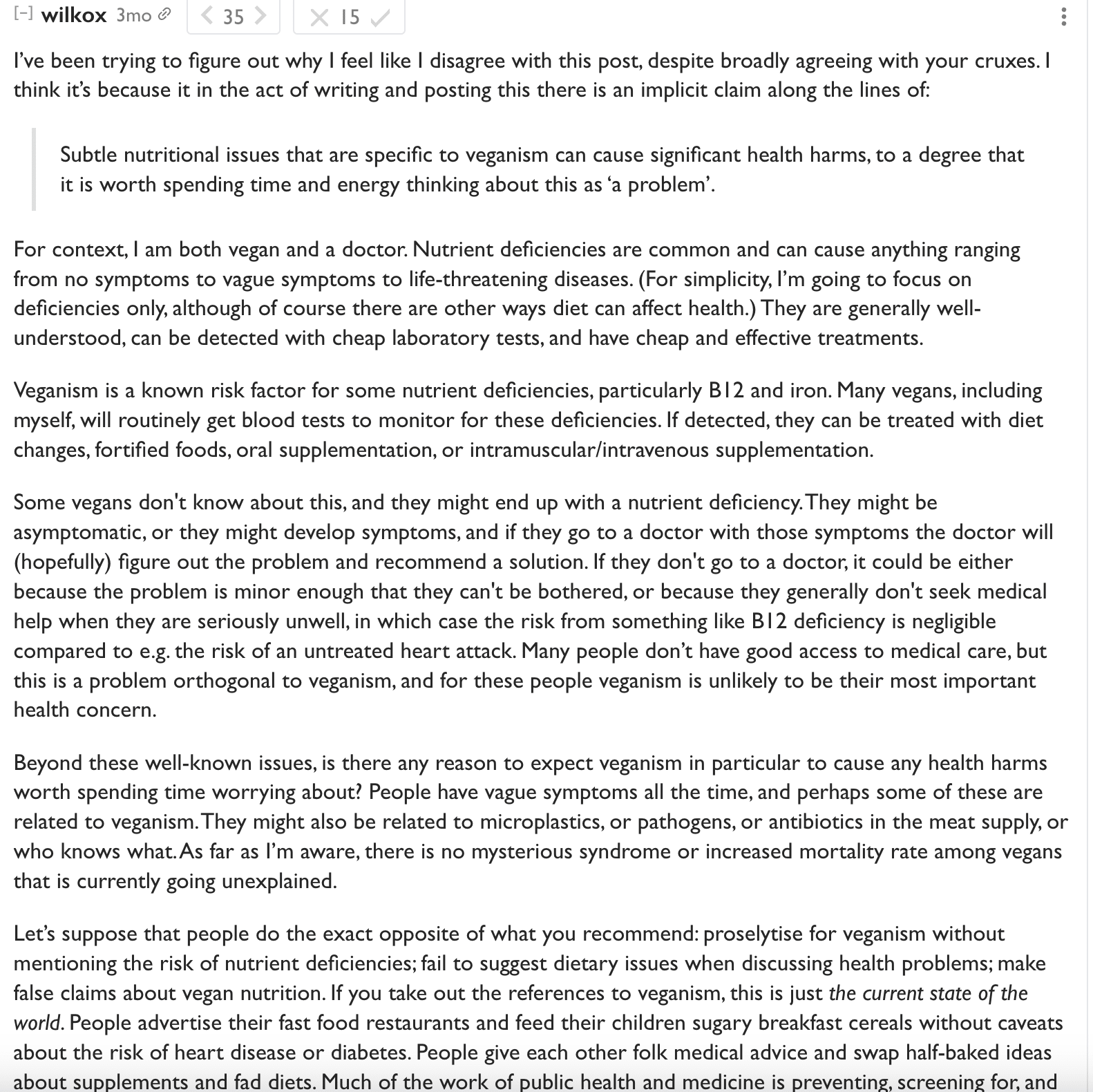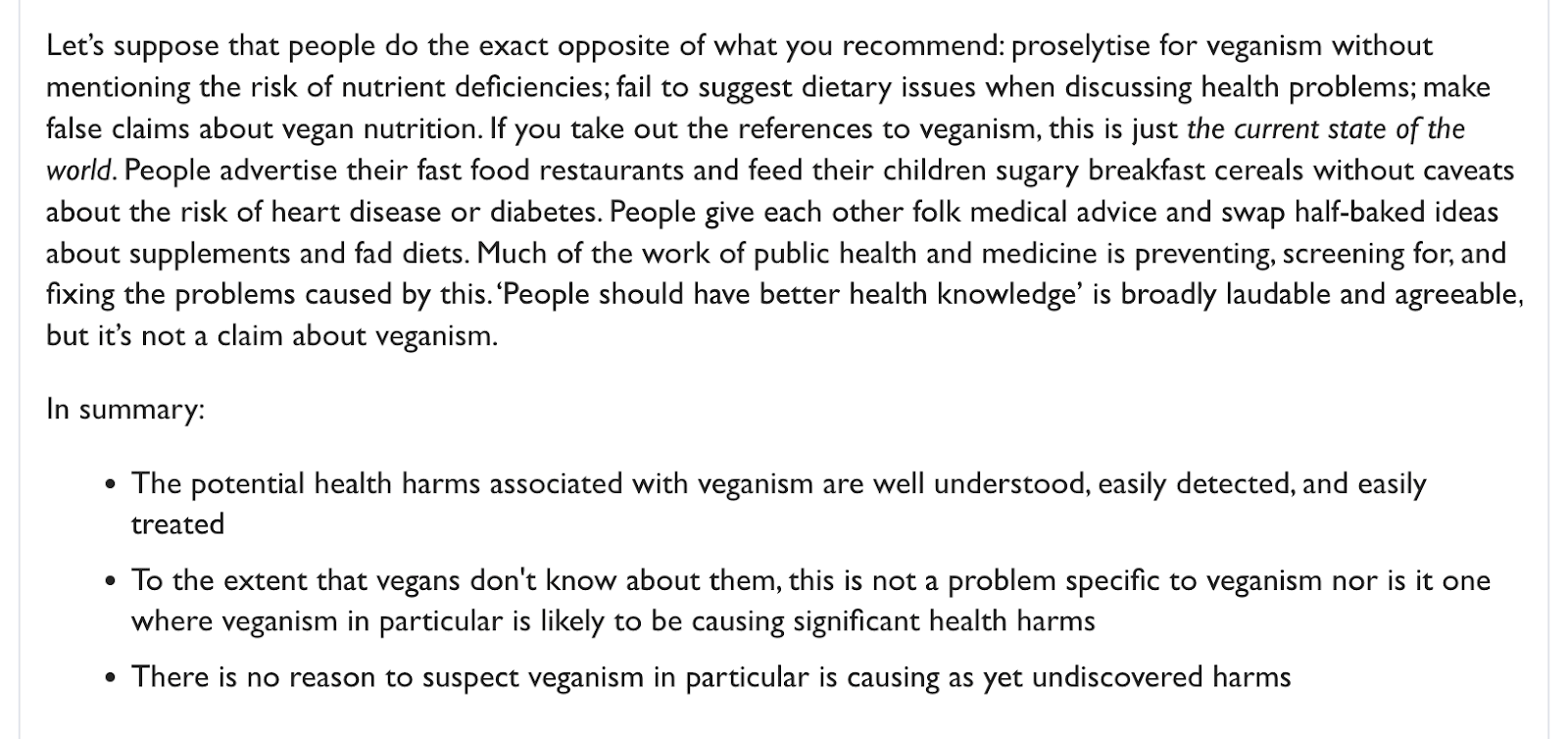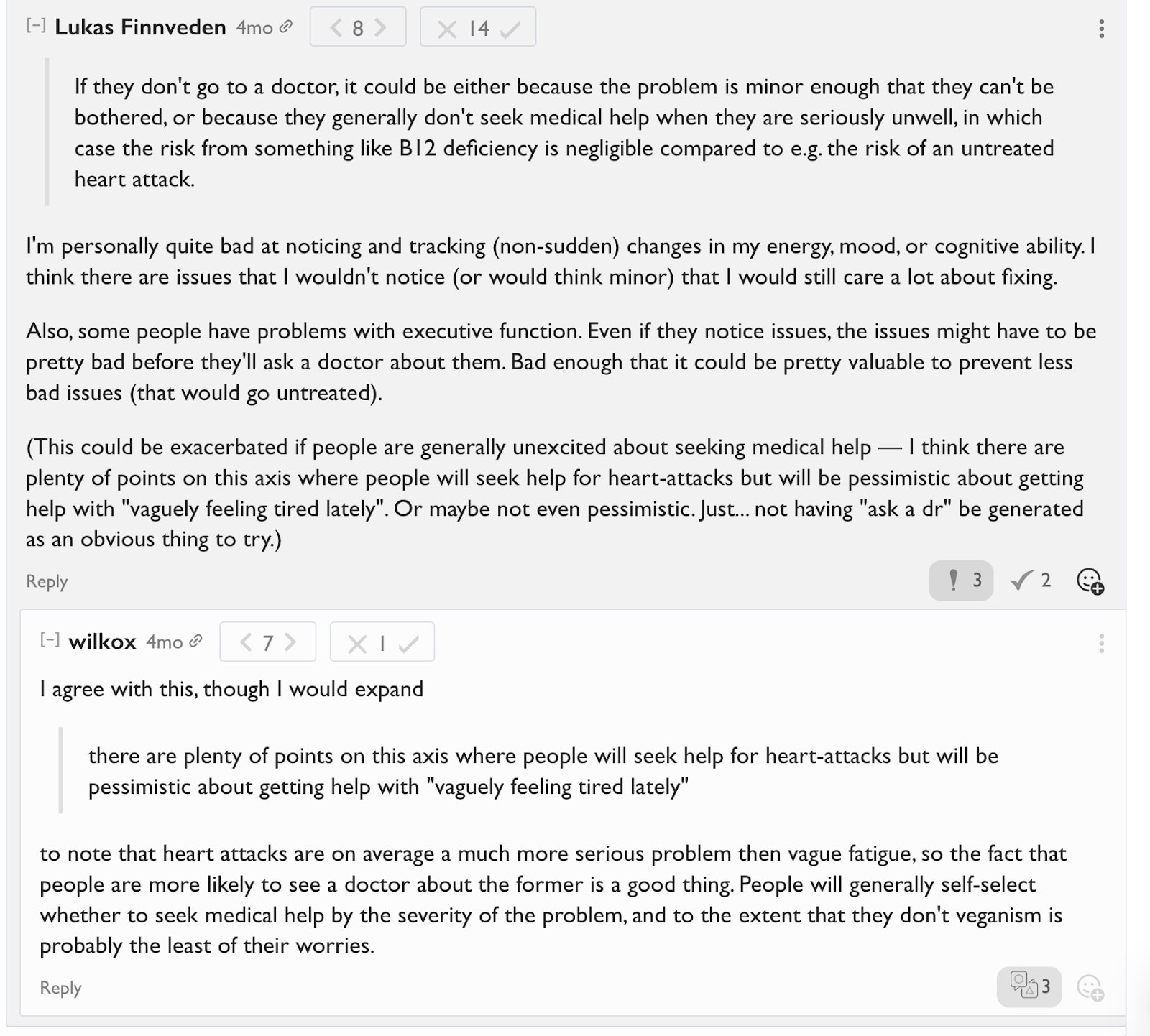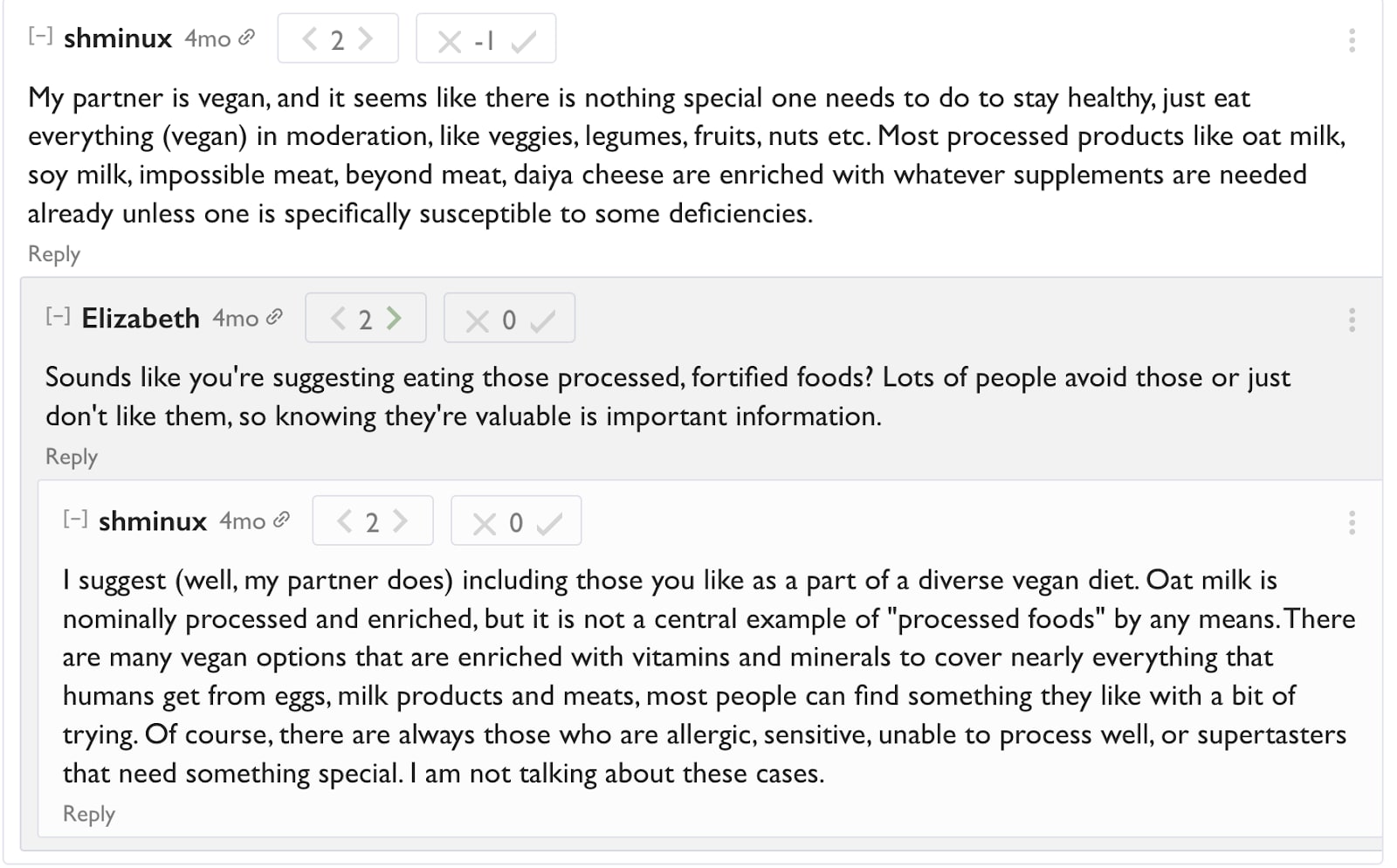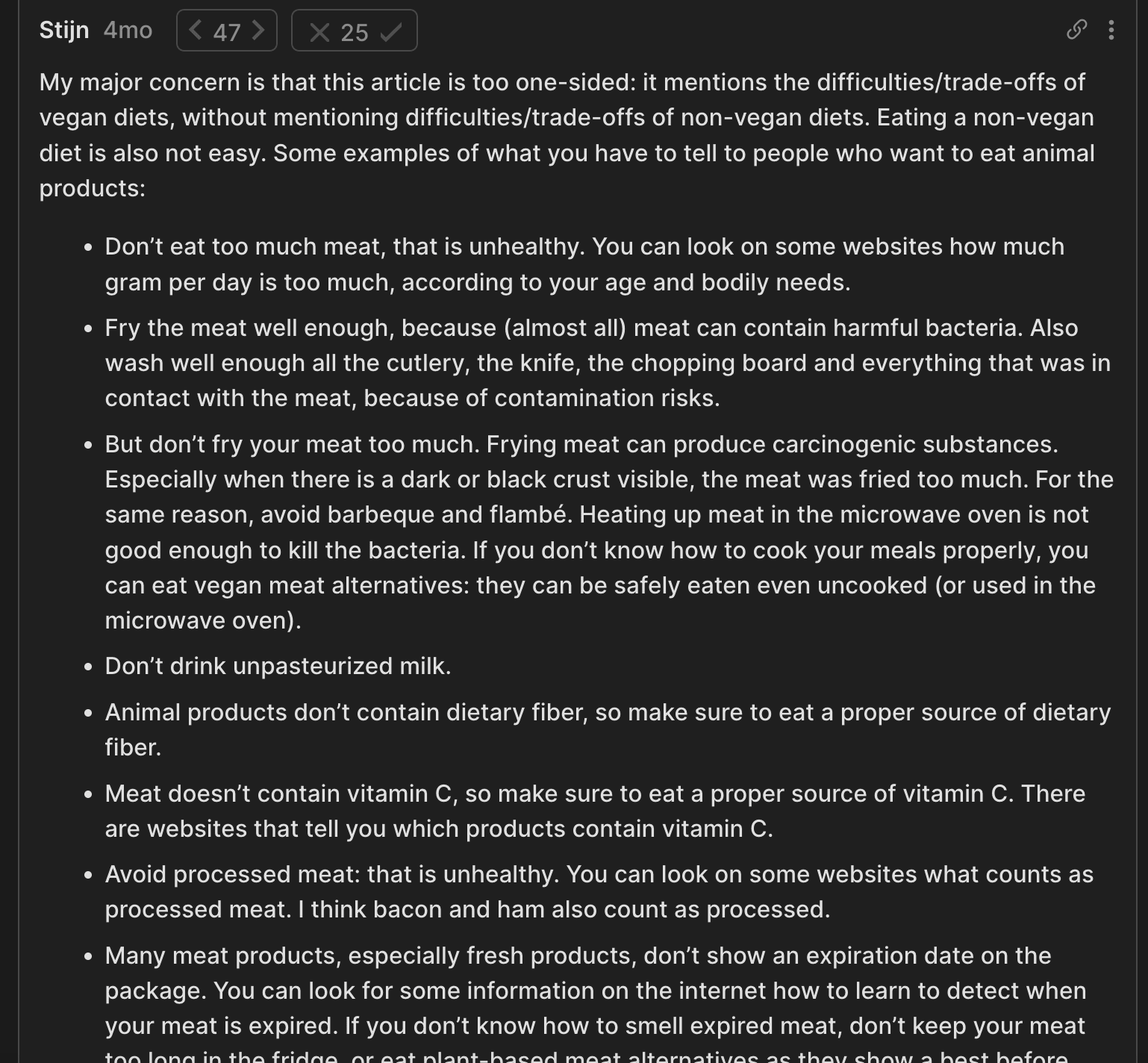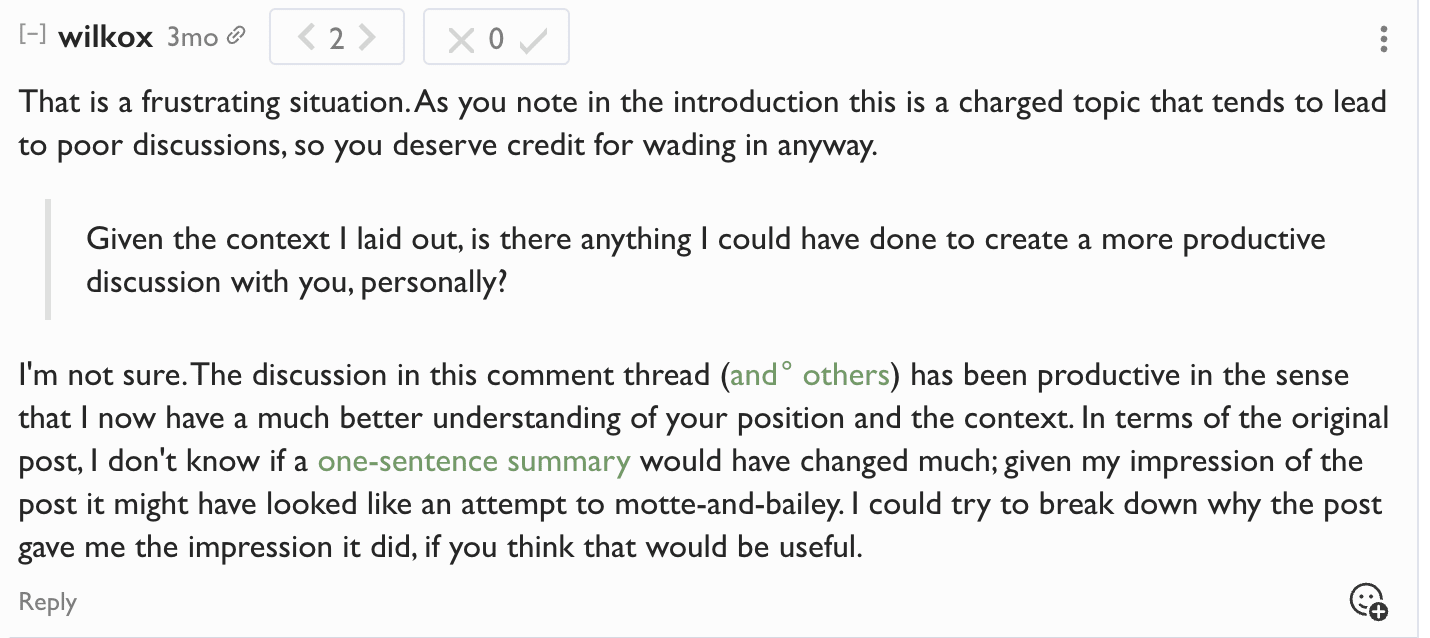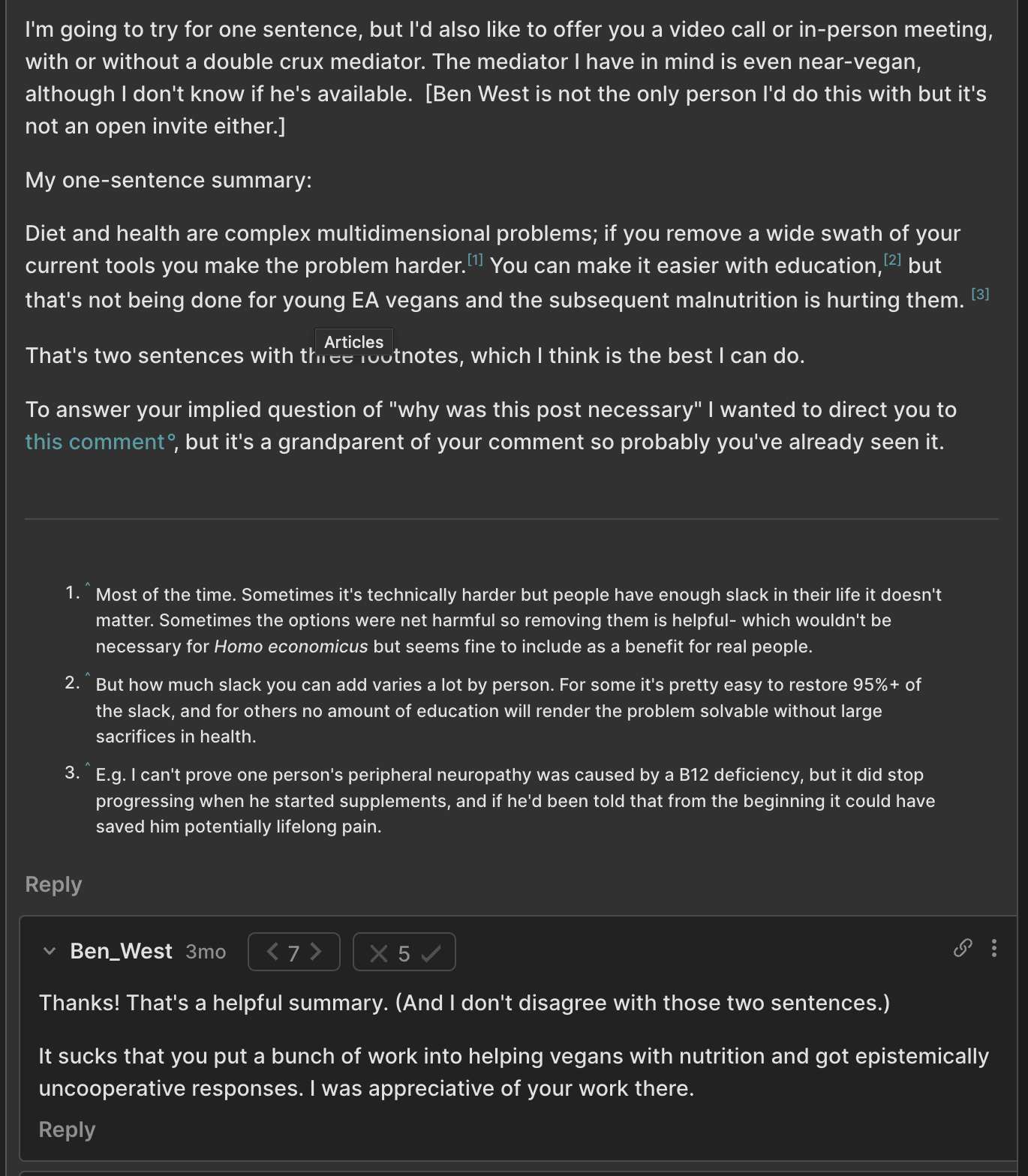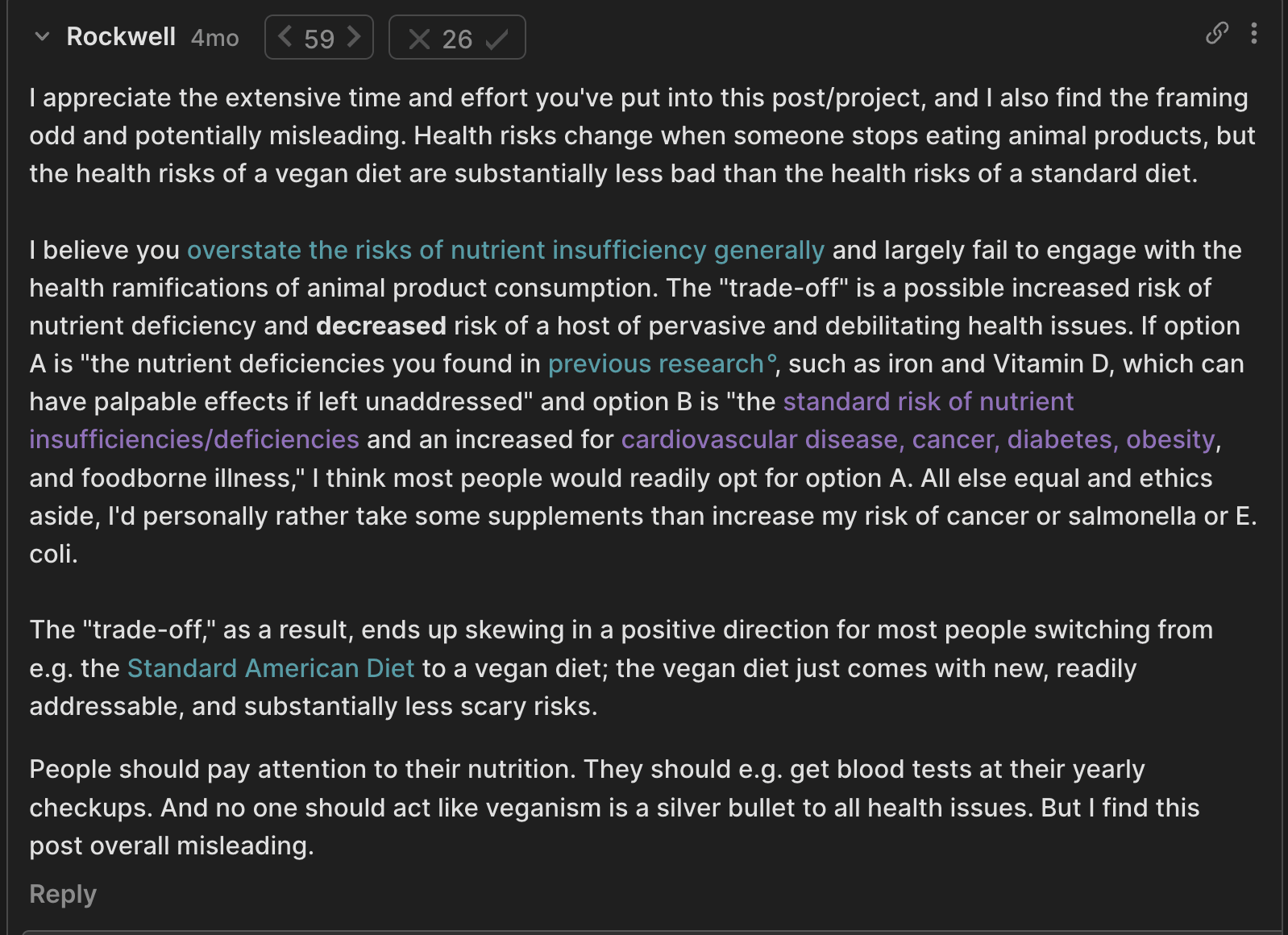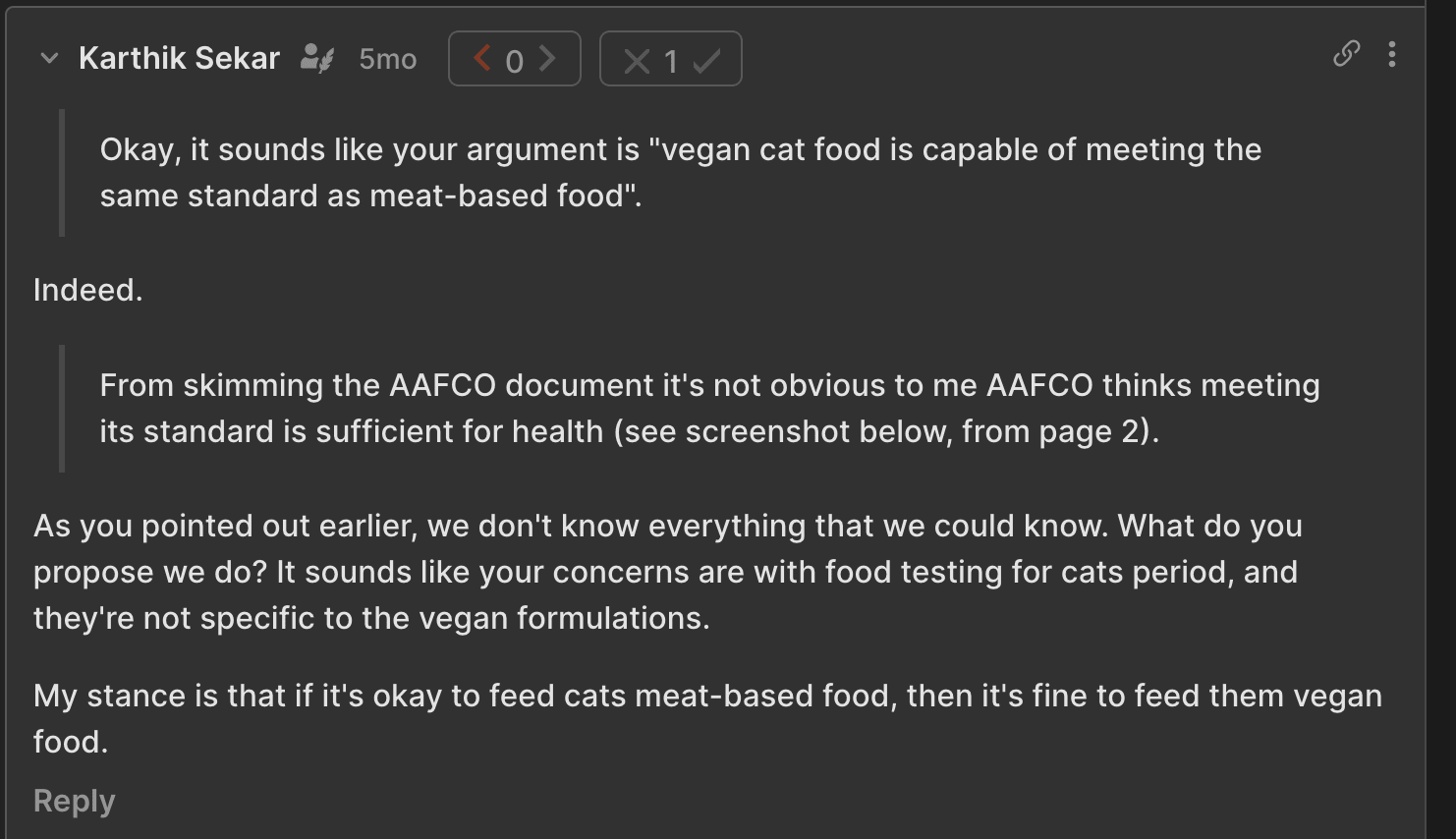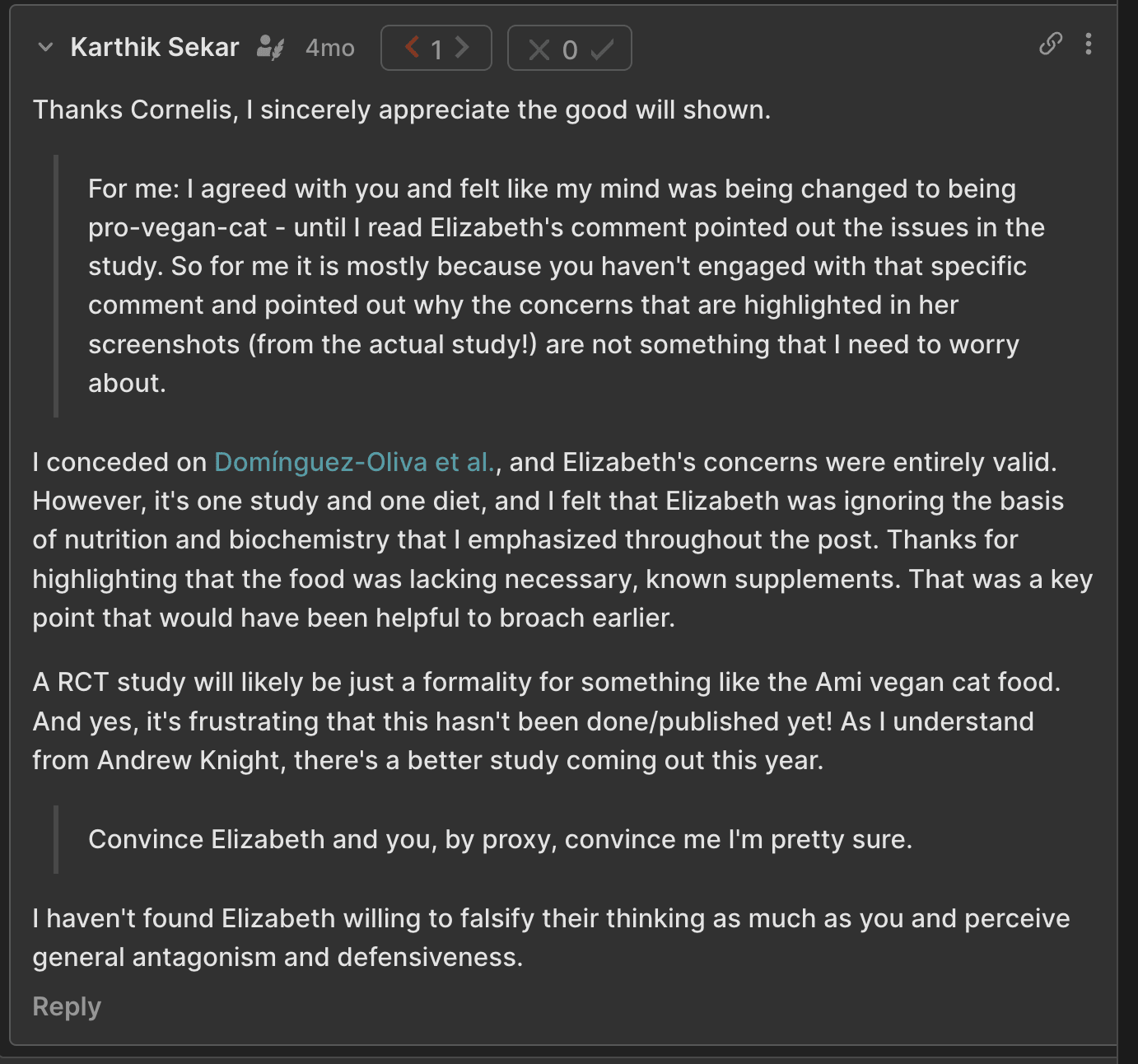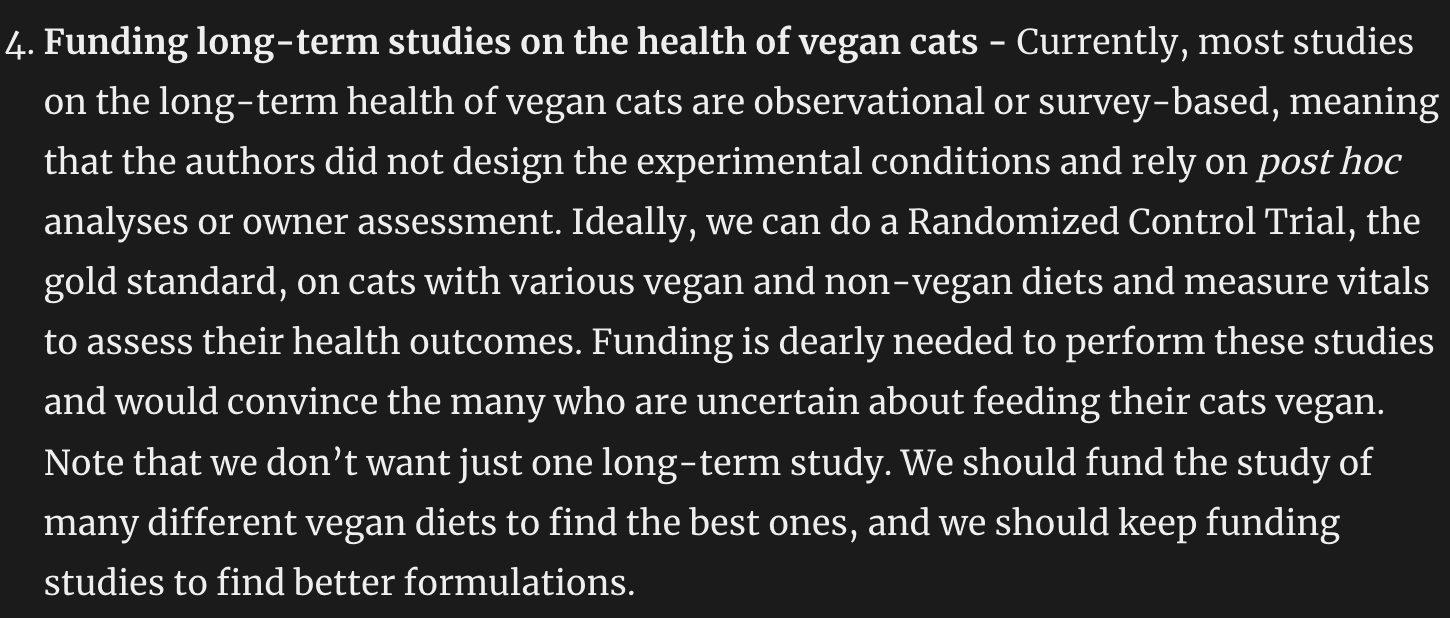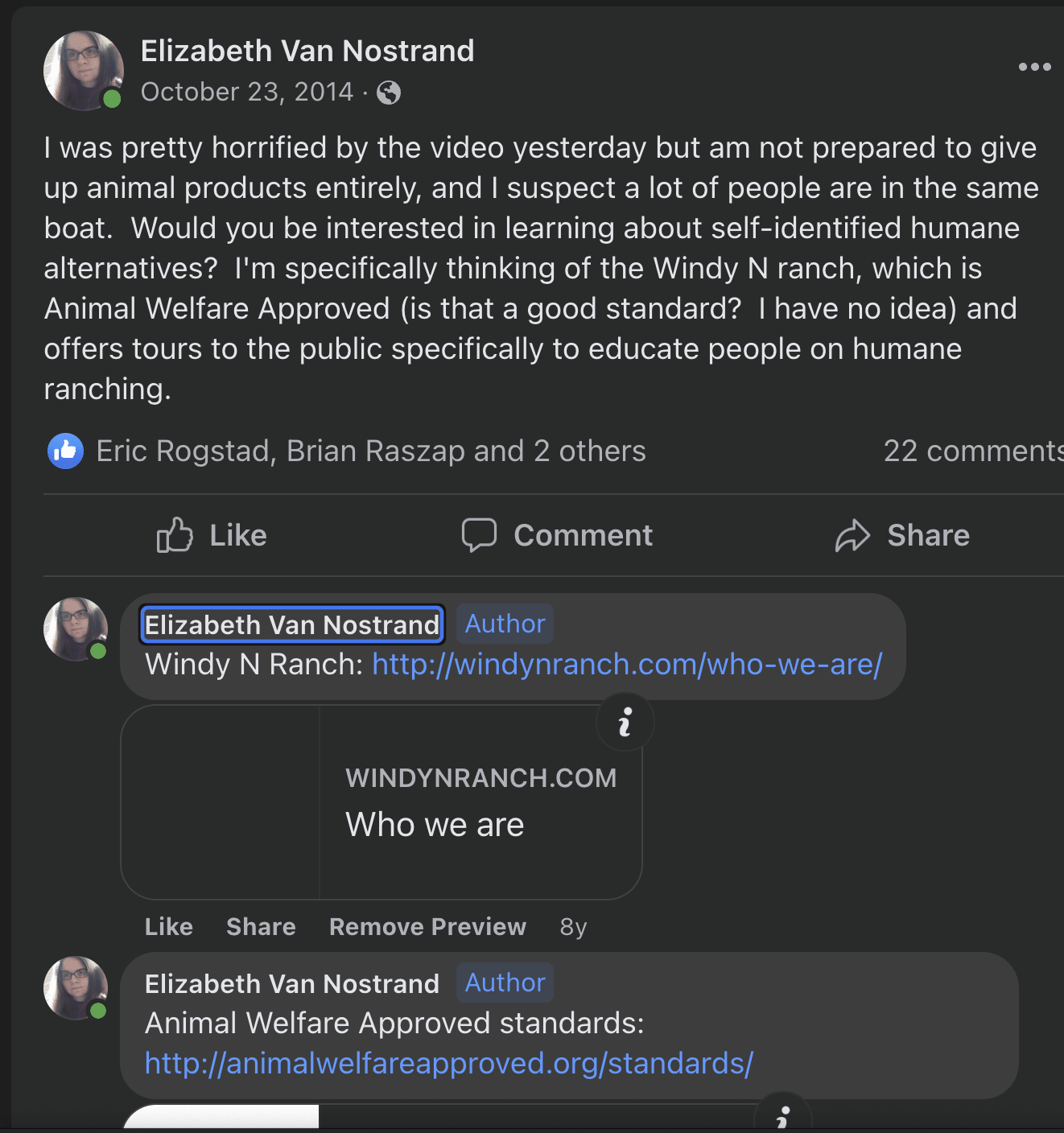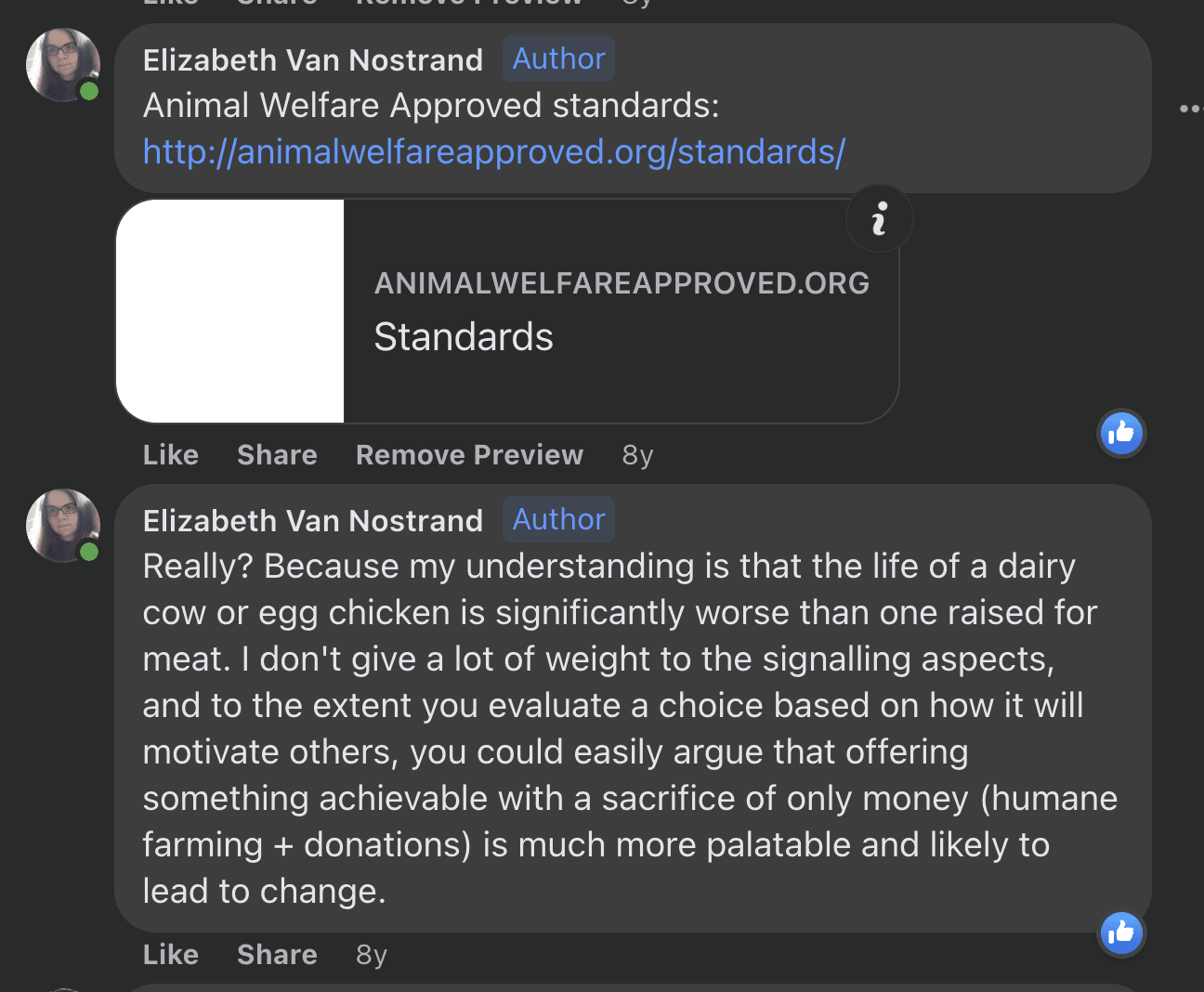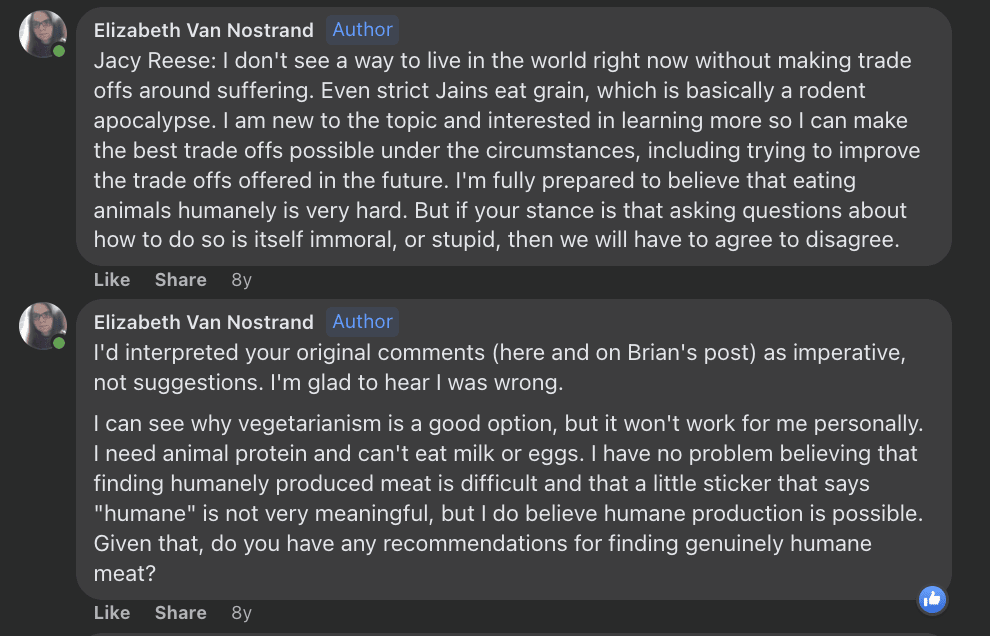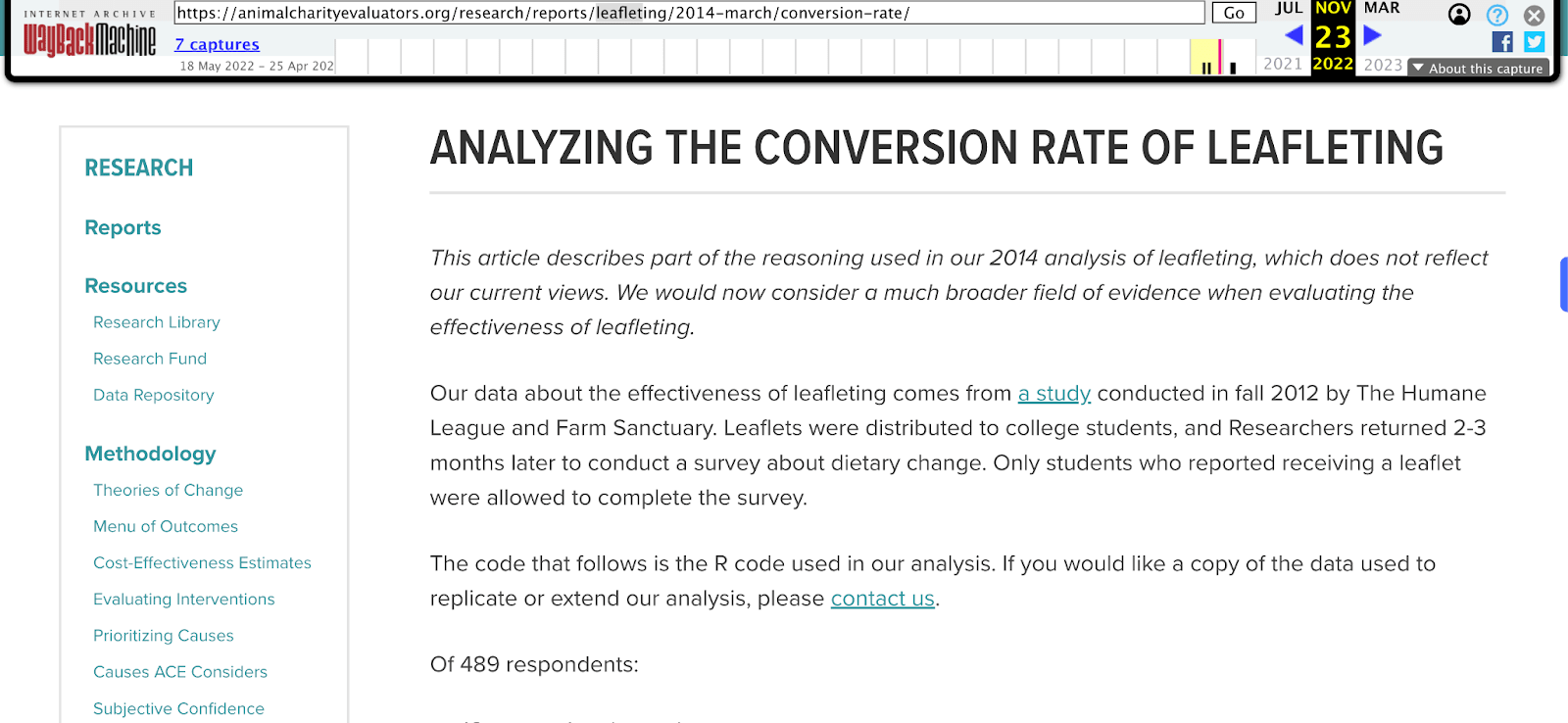EA Vegan Advocacy is not truthseeking, and it’s everyone’s problem
By Elizabeth @ 2023-09-29T04:04 (+128)
This is a linkpost to https://acesounderglass.com/2023/09/28/ea-vegan-advocacy-is-not-truthseeking-and-its-everyones-problem/
note: I've made a couple of edits to this post. Keeping the post up to date in 3 locations has been a disaster, and one casualty has been images that linked to source material now don't. I'm reaching out to the LW and EAF team, but until then to see the source material please click through to my blog where the links are intact.
Introduction
Effective altruism prides itself on truthseeking. That pride is justified in the sense that EA is better at truthseeking than most members of its reference category, and unjustified in that it is far from meeting its own standards. We’ve already seen dire consequences of the inability to detect bad actors who deflect investigation into potential problems, but by its nature you can never be sure you’ve found all the damage done by epistemic obfuscation because the point is to be self-cloaking.
My concern here is for the underlying dynamics of EA’s weak epistemic immune system, not any one instance. But we can’t analyze the problem without real examples, so individual instances need to be talked about. Worse, the examples that are easiest to understand are almost by definition the smallest problems, which makes any scapegoating extra unfair. So don’t.
This post focuses on a single example: vegan advocacy, especially around nutrition. I believe vegan advocacy as a cause has both actively lied and raised the cost for truthseeking, because they were afraid of the consequences of honest investigations. Occasionally there’s a consciously bad actor I can just point to, but mostly this is an emergent phenomenon from people who mean well, and have done good work in other areas. That’s why scapegoating won’t solve the problem: we need something systemic.
In the next post I’ll do a wider but shallower review of other instances of EA being hurt by a lack of epistemic immune system. I already have a long list, but it’s not too late for you to share your examples.
Definitions
I picked the words “vegan advocacy” really specifically. “Vegan” sometimes refers to advocacy and sometimes to just a plant-exclusive diet, so I added “advocacy” to make it clear.
I chose “advocacy” over “advocates” for most statements because this is a problem with the system. Some vegan advocates are net truthseeking and I hate to impugn them. Others would like to be epistemically virtuous but end up doing harm due to being embedded in an epistemically uncooperative system. Very few people are sitting on a throne of plant-based imitation skulls twirling their mustache thinking about how they’ll fuck up the epistemic commons today.
When I call for actions I say “advocates” and not “advocacy” because actions are taken by people, even if none of them bear much individual responsibility for the problem.
I specify “EA vegan advocacy” and not just “vegan advocacy” not because I think mainstream vegan advocacy is better, but because 1. I don’t have time to go after every wrong advocacy group in the world. 2. Advocates within Effective Altruism opted into a higher standard. EA has a right and responsibility to maintain the standards of truth it advocates, even if the rest of the world is too far gone to worry about.
Audience
If you’re entirely uninvolved in effective altruism you can skip this, it’s inside baseball and there’s a lot of context I don’t get into.
How EA vegan advocacy has hindered truthseeking
EA vegan advocacy has both pushed falsehoods and punished people for investigating questions it doesn’t like. It manages this even for positions that 90%+ of effective altruism and the rest of the world agree with, like “veganism is a constraint”. I don’t believe its arguments convince anyone directly, but end up having a big impact by making inconvenient beliefs too costly to discuss. This means new entrants to EA are denied half of the argument, and harm themselves due to ignorance.
This section outlines the techniques I'm best able to name and demonstrate. For each technique I’ve included examples. Comments on my own posts are heavily overrepresented because they’re the easiest to find; “go searching through posts on veganism to find the worst examples” didn’t feel like good practice. I did my best to quote and summarize accurately, although I made no attempt to use a representative sample. I think this is fair because a lot of the problem lies in the fact that good comments don’t cancel out bad, especially when the good comments are made in parallel rather than directly arguing with the bad. I’ve linked to the source of every quote and screen shot, so you can (and should) decide for yourself. I’ve also created a list of all of my own posts I’m drawing from, so you can get a holistic view.
My posts:
- Iron deficiencies are very bad and you should treat them (LessWrong, EAForum)
- Vegan Nutrition Testing Project: Interim Report (LessWrong, EAForum)
- Lessons learned from offering in-office nutritional testing (LessWrong, EAForum)
- What vegan food resources have you found useful? (LessWrong, EAForum) (not published on my own blog)
- Playing with Faunalytics’ Vegan Attrition Data (LessWrong, EAForum)
- Change my mind: Veganism entails trade-offs, and health is one of the axes (LessWrong, EAForum)
- Adventist Health Study-2 supports pescetarianism more than veganism (LessWrong, EAForum)
I should note I quote some commenters and even a few individual comments in more than one section, because they exhibit more than one problem. But if I refer to the same comment multiple times in a row I usually only link to it once, to avoid implying more sources than I have.
My posts were posted on my blog, LessWrong, and EAForum. In practice the comments I drew from came from LessWrong (white background) and EAForum (black background). I tried to go through those posts and remove all my votes on comments (except the automatic vote for my own comments) so that you could get an honest view of how the community voted without my thumb on the scale, but I’ve probably missed some, especially on older posts. On the main posts, which received a lot of traffic, I stuck to well-upvoted comments, but I included some low (but still positive) karma comments from unpopular posts.
The goal here is to make these anti-truthseeking techniques legible for discussion, not develop complicated ways to say “I don’t like this”, so when available I’ve included counter examples. These are comments that look similar to the ones I’m complaining about, but are fine or at least not suffering from the particular flaw in that section. In doing this I hope to keep the techniques’ definitions narrow.
Active suppression of inconvenient questions
A small but loud subset of vegan advocacy will say outright you shouldn’t say true things, because it leads to outcomes they dislike. This accusation is even harsher than “not truthseeking”, and would normally be very hard to prove. If I say “you’re saying that because you care more about creating vegans than the health of those you create”, and they say “no I’m not”, I don’t really have a come back. I can demonstrate that they’re wrong, but not their motivation. Luckily, a few people said the quiet part out loud.
Commenter Martin Soto pushed back very hard on my first nutrition testing study. Finally I asked him outright if he thought it was okay to share true information about vegan nutrition. His response was quite thoughtful and long, so you should really go read the whole thing, but let me share two quotes
He goes on to say:
And in a later comment
EDIT 2023-10-03: Martin disputes my summary of his comments. I think it's good practice to link to disputes like this, even though I stand by my summary. I also want to give a heads-up that I see his comments in the dispute thread as continuing the patterns I describe (which makes that thread a tax on the reader). If you want to dig into this, I strongly suggest you first read his original comments and come up with your own summary, so you can compare that to each of ours.
The charitable explanation here is that my post focuses on naive veganism, and Soto thinks that’s a made-up problem. He believes this because all of the vegans he knows (through vegan advocacy networks) are well-educated on nutrition. There are a few problems here, but the most fundamental is that enacting his desired policy of suppressing public discussion of nutrition issues with plant-exclusive diets will prevent us from getting the information to know if problems are widespread. My post and a commenter’s report on their college group are apparently the first time he’s heard of vegans who didn’t live and breathe B12.
I have a lot of respect for Soto for doing the math and so clearly stating his position that “the damage to people who implement veganism badly is less important to me than the damage to animals caused by eating them”. Most people flinch away from explicit trade-offs like that, and I appreciate that he did them and own the conclusion. But I can’t trust his math because he’s cut himself off from half the information necessary to do the calculations. How can he estimate the number of vegans harmed or lost due to nutritional issues if he doesn’t let people talk about them in public?
In fact the best data I found on this was from Faunalytics, which found that ~20% of veg*ns drop out due to health reasons. This suggests to me a high chance his math is wrong and will lead him to do harm by his own standards.
EDIT 2023-10-04: . Using Faunalytics numbers for self-reported health issues and improvements after quitting veg*nism, I calculated that 20% of veg*ns develop health issues. This number is sensitive to your assumptions; I consider 20% conservative but it could be an overestimate. I encourage you to read the whole post and play with my model, and of course read the original work.
Most people aren’t nearly this upfront. They will go through the motions of calling an idea incorrect before emphasizing how it will lead to outcomes they dislike. But the net effect is a suppression of the exploration of ideas they find inconvenient.
This post on Facebook is a good example. Normally I would consider facebook posts out of bounds, especially ones this old (over five years). Facebook is a casual space and I want people to be able to explore ideas without being worried that they’re creating a permanent record that will be used against them. In this case I felt that because the post was permissioned to public and a considered statement (rather than an off the cuff reply), the truth value outweighed the chilling effect. But because it’s so old and I don’t know how the author’s current opinion, I’m leaving out their name and not linking to the post.
The author is midlist EA- I’d heard of them for other reasons, but they’re certainly not EA-famous.
There are posts very similar to this one I would have been fine with, maybe even joyful about. You could present evidence against the claims that X is harmful, or push people to verify things before repeating them, or suggest we reserve the word poison for actual kill-you-dead molecules and not complicated compound constructions with many good parts and only weak evidence of mild long-term negative effects. But what they actually did was name-check the idea that X is fine before focusing on the harm to animals caused by repeating the claim- which is exactly what you’d expect if the health claims were true but inconvenient. I don’t know what this author actually believes, but I do know focusing on the consequences when the facts are in question is not truthseeking.
A subtler version comes from the AHS-2 post. At the time of this comment the author, Rockwell, described herself as the leader of EA NYC and an advisor to philanthropists on animal suffering, so this isn’t some rando having a feeling. This person has some authority.
This comment more strongly emphasizes the claim that my beliefs are wrong, not just inconvenient. And if they’d written that counter-argument they promised I’d be putting this in the counter-examples section. But it’s been three months and they have not written anything where I can find it, nor responded to my inquiries. So even if literal claim were correct, she’s using a technique whose efficacy is independent of truth.
Over on the Change My Mind post the top comment says that vegan advocacy is fine because it’s no worse than fast food or breakfast cereal ads
I’m surprised someone would make this comment. But what really shocks me is the complete lack of pushback from other vegan advocates. If I heard an ally described our shared movement as no worse than McDonalds, I would injure myself in my haste to repudiate them.
Counter-Examples
This post on EAForum came out while I was finishing this post. The author asks if they should abstain from giving bad reviews to vegan restaurants, because it might lead to more animal consumption- which would be a central example of my complaint. But the comments are overwhelmingly “no, there’s not even a good consequentialist argument for that”, and the author appears to be taking that to heart. So from my perspective this is a success story.
Ignore the arguments people are actually making
I’ve experienced this pattern way too often.
Me: goes out of my way to say not-X in a post
Comment: how dare you say X! X is so wrong!
Me: here’s where I explicitly say not-X.
*crickets*
This is by no means unique to posts about veganism. “They’re yelling at me for an argument I didn’t make” is a common complaint of mine. But it happens so often, and so explicitly, in the vegan nutrition posts. Let me give some examples.
My post:
Commenter:
My post:
Commenters:
My post:
Commenter:
My post:
Commenter:
My post:
Commenter:
You might be thinking “well those posts were very long and honestly kind of boring, it would be unreasonable to expect people to read everything”. But the length and precision are themselves a response to people arguing with positions I don’t hold (and failing to update when I clarify). The only things I can do are spell out all of my beliefs or not spell out all of my beliefs, and either way ends with comments arguing against views I don’t have.
Frame control/strong implications not defended/fuzziness
This is the hardest one to describe. Sometimes people say things, and I disagree, and we can hope to clarify that disagreement. But sometimes people say things and responding is like nailing jello to a wall. Their claims aren’t explicit, or they’re individually explicit but aren’t internally consistent, or play games with definitions. They “counter” statements in ways that might score a point in debate club but don’t address the actual concern in context.
One example is the top-voted comment on LW on Change My Mind
Over a very long exchange I attempt to nail down his position:
- Does he think micronutrient deficiencies don’t exist? No, he agrees they do.
- Does he think that they can’t cause health issues? No, he agrees they do.
- Does he think this just doesn’t happen very often, or is always caught? No, if anything he thinks the Faunalytics underestimates the veg*n attrition due to medical issues.
So what exactly does he disagree with me on?
He also had a very interesting exchange with another commenter. That thread got quite long, and fuzziness by its nature doesn’t lend itself to excerpts, so you should read the whole thing, but I will share highlights.
Before the screenshot: Wilkox acknowledges that B12 and iron deficiencies can cause fatigue, and veganism can cause these deficiencies, but it’s fine because if people get tired they can go to a doctor.
That reply doesn’t contain any false statements, and would be perfectly reasonable if we were talking about ER triage protocols. But it’s irrelevant when the conversation is “can we count on veganism-induced fatigue being caught?”. (The answer is no, and only some of the reasons have been brought up here)
You can see how the rest of this conversation worked out in the Sound and Fury section.
A much, much milder example can be seen in What vegan food resources have you found useful?. This was my attempt to create something uncontroversially useful, and I’d call it a modest success. The post had 20-something karma on LW and EAForum, and there were several useful-looking resources shared on EAForum. But it also got the following comment on LW:
I picked this example because it only takes a little bit of thought to see the jujitsu, so little it barely counts. He disagreed with my implicit claim that… well okay here’s the problem. I’m still not quite sure where he disagrees. Does he think everyone automatically eats well as a vegan? That no one will benefit from resources like veganhealth.org? That no one will benefit from a cheat sheet for vegan party spreads? That there is no one for whom veganism is challenging? He can’t mean that last one because he acknowledges exceptions in his later comment, but only because I pushed back. Maybe he thinks that the only vegans who don’t follow his steps are those with medical issues, and that no-processed-food diets are too unpopular to consider?
I don’t think this was deliberately anti-truthseeking, because if it was he would have stopped at “nothing special” instead of immediately outlining the special things his partner does. That was fairly epistemically cooperative. But it is still an example of strong claims made only implicitly.
Counter-Examples
I think this comment makes a claim (“vegans moving to naive omnivorism will hurt themselves”) clearly, and backs it up with a lot of details.
The tone is kind of obnoxious and he’s arguing with something I never claimed, but his beliefs are quite clear. I can immediately understand which beliefs of his I agree with (“vegans moving to naive omnivorism will hurt themselves” and “that would be bad”) and make good guesses at implicit claims I disagree with (“and therefore we should let people hurt themselves with naive veganism”? “I [Elizabeth] wouldn’t treat naive mass conversion to omnivorism seriously as a problem”?). That’s enough to count as epistemically cooperative.
Sound and fury, signifying no substantial disagreement
Sometimes someone comments with an intense, strongly worded, perhaps actively hostile, disagreement. After a laborious back and forth, the problem dissolves: they acknowledge I never held the position they were arguing with, or they don’t actually disagree with my specific claims.
Originally I felt happy about these, because “mostly agreeing” is an unusually positive outcome for that opening. But these discussions are grueling. It is hard to express kindness and curiosity towards someone yelling at you for a position you explicitly disclaimed. Any one of these stories would be a success but en masse they amount to a huge tax on saying anything about veganism, which is already quite labor intensive.
The discussions could still be worth it if it changed the arguer’s mind, or at least how they approached the next argument. But I don’t get the sense that’s what happens. Neither of us have changed our minds about anything, and I think they’re just as likely to start a similar fight the next week.
I do feel like vegan advocates are entitled to a certain amount of defensiveness. They encounter large amounts of concern trolling and outright hostility, and it makes sense that that colors their interactions. But that allowance covers one comment, maybe two, not three to eight (Wilkox, depending on which ones you count).
For example, I’ve already quoted Wilkox’s very fuzzy comment (reminder: this was the top voted comment on that post on LW). That was followed by a 13+ comment exchange in which we eventually found he had little disagreement with any of my claims about vegan nutrition, only the importance of these facts. There really isn’t a way for me to screenshot this: the length and lack of specifics is the point.
You could say that the confusion stemmed from poor writing on my part, but:
I really appreciate the meta-honesty here, but since the exchange appears to have eaten hours of both of our time just to dig ourselves out of a hole, I can’t get that excited about it.
Counter-Examples
I want to explicitly note that Sound and Fury isn’t the same as asking questions or not understanding a post. E.g. here Ben West identifies a confusion, asks me, and accepts both my answer and an explanation of why answering is difficult.
Or in that same post, someone asked me to define nutritionally dense. It took a bit for me to answer and we still disagreed afterward, but it was a great question and the exchange felt highly truthseeking.
Bad sources, badly handled
Citations should be something of a bet: if the citation (the source itself or your summary of it) is high quality and supports your point, that should move people closer to your views. But if they identify serious relevant flaws, that should move both you and your audience closer to their point of view. Of course our beliefs are based on a lot of sources and it’s not feasible or desirable to really dig into all of them for every disagreement, so the bet may be very small. But if you’re not willing to defend a citation, you shouldn’t make it.
What I see in EA vegan advocacy is deeply terrible citations, thrown out casually, and abandoned when inconvenient. I’ve made something of a name for myself checking citations and otherwise investigating factual claims from works of nonfiction. Of everything I’ve investigated, I think citations from EA vegan advocacy have the worst effort:truth ratio. Not outright more falsehoods, I read some pretty woo stuff, but those can be dismissed quickly. Citations in vegan advocacy are often revealed to be terrible only after great effort.
And having put in that effort, my reward is usually either crickets, or a new terrible citation. Sometimes we will eventually drill into “I just believe it”, which is honestly fine. We don’t live our lives to the standard of academic papers. But if that’s your reason, you need to state it from the beginning.
For example, in the top voted comment on Change My Mind post on EAF, Rockwell (head of EA NYC) has five links in her post. Only links 1 and 4 are problems, but I'll describe them in order to avoid confusion.
Of the five links:
- Wilkox’s comment on the LW version of the post, where he eventually agrees that veganism requires testing and supplementation for many people (although most of that exchange hadn’t happened at the time of linking).
- cites my past work, if anything too generously.
- an estimation of nutrient deficiency in the US. I don’t love that this uses dietary intake as opposed to testing values (people's needs vary so wildly), but at least it used EAR and not RDA. I’d want more from a post but for a comment this is fine.
- an absolutely atrocious article, which the comment further misrepresents. We don’t have time to get all the flaws in that article, so I’ve put my first hour of criticisms in the appendix. What really gets me here is that I would have agreed the standard American diet sucks without asking for a source. I thought I had conceded that point preemptively, albeit not naming Standard American Diet explicitly.
And if she did feel a need go the extra mile on rigor for this comment, it’s really not that hard to find decent-looking research about the harms of the Standard Shitty American Diet. I found this paper on heart disease in 30 seconds, and most of that time was spent waiting for Elicit to load. I don’t know if it’s actually good, but it is not so obviously farcical as the cited paper. - The fifth link goes to a description of the Standard American Diet.
Rockwell did not respond to my initial reply (that fixing vegan issues is easier than fixing SSAD), or my asking if that paper on the risks of meat eating was her favorite.
A much more time-consuming version of this happened with Adventist Health Study-2. Several people cited the AHS-2 as a pseudo-RCT that supported veganism (EDIT 2023-10-03: as superior to low meat omnivorism). There’s one commenter on LessWrong and two on EAForum (one of whom had previously co-authored a blog post on the study and offered to answer questions). As I discussed here, that study is one of the best we have on nutrition and I’m very glad people brought it to my attention. But calling it a pseudo-RCT that supports veganism is deeply misleading. It is nowhere near randomized, and doesn’t cleanly support veganism even if you pretend it is.
(EDIT 2023-10-03: To be clear, the noise in the study overwhelms most differences in outcomes, even ignoring the self-sorting. My complaint is that the study was presented as strong evidence in one direction, when it’s both very weak and, if you treat it as strong, points in a different direction than reported. One commenter has said she only meant it as evidence that a vegan diet can work for some people, which I agree with, as stated in the post she was responding to. She disagrees with other parts of my summary as well, you can read more here)
It’s been three months, and none of the recommenders have responded to my analysis of the main AHS-2 paper, despite repeated requests.
But finding a paper is of lower quality and supports an entirely different conclusion is still not the worst-case scenario. The worst outcome is citation whack-a-mole.
A good example of this is from the post “Getting Cats Vegan is Possible and Imperative”, by Karthik Sekar. Karthik is a vegan author and data scientist at a plant-based meat company.
[Note that I didn’t zero out my votes on this post’s comments, because it seemed less important for posts I didn’t write]
Karthik cites a lot of sources in that post. I picked what looked like his strongest source and investigated. It was terrible. It was a review article, so checking it required reading multiple studies. Of the cited studies, only 4 (with a total of 39 combined subjects) use blood tests rather than owner reports, and more than half of those were given vegetarian diets, not vegan (even though the table header says vegan). The only RCT didn't include carnivorous diets.
Karthik agrees that paper (that he cited) is not making its case “strong nor clear”, and cites another one (which AFAICT was not in the original post).
I dismiss the new citation on the basis of “motivated [study] population and minimal reporting”.
He retreats to “[My] argument isn't solely based on the survey data. It's supported by fundamentals of biochemistry, metabolism, and digestion too [...] Mammals such as cats will digest food matter into constituent molecules. Those molecules are chemically converted to other molecules--collectively, metabolism--, and energy and biomass (muscles, bones) are built from those precursors. For cats to truly be obligate carnivores, there would have to be something exceptional about meat: (A) There would have to be essential molecules--nutrients--that cannot be sourced anywhere else OR (B) the meat would have to be digestible in a way that's not possible with plant matter. [...So any plant-based food that passes AAFCO guidelines is nutritionally complete for cats. Ami does, for example.]
I point out that AAFCO doesn’t think meeting their guidelines is necessarily sufficient. I expected him to dismiss this as corporate ass-covering, and there’s a good chance he’d be right. But he didn’t.
Finally, he gets to his real position:
Which would have been a fine aspirational statement, but then why include so many papers he wasn’t willing to stand behind?
On that same post someone else says that they think my concerns are a big deal, and Karthik probably can’t convince them without convincing me. Karthik responds:
So he’s conceded that his study didn’t show what he claimed. And he’s not really defending the AAFCO standards. But he’s really sure this will work anyway? And I’m the one who won’t update their beliefs.
In a different comment the same someone else notes a weird incongruity in the paper. Karthik doesn’t respond.
This is the real risk of the bad sources: hours of deep intellectual work to discover that his argument boils down to a theoretical claim the author could have stated at the beginning. “I believe vegan cat food meets these numbers and meeting these numbers is sufficient” honestly isn’t a terrible argument, and I’d have respected it plainly stated, especially since he explicitly calls for RCTs. Or I would, if he didn’t view those RCTs primarily as a means to prove what he already knows.
Counter-Examples
This commenter starts out pretty similarly to the others, with a very limited paper implied to have very big implications. But when I push back on the serious limitations of the study, he owns the issues and says he only ever meant the paper to support a more modest claim (while still believing the big claim he did make?).
Taxing Facebook
When I joined EA Facebook in 2014, it was absolutely hopping. Every week I met new people and had great discussions with them where we both walked away smarter. I’m unclear when this trailed off because I was drifting away from EA at the same time, but let’s say the golden age was definitively over by 2018. Facebook was where I first noticed the pattern with EA vegan advocacy.
Back in 2014 or 2015, Seattle EA watched some horrifying factory farming documentaries, and we were each considering how we should change our diets in light of that new information. We tried to continue the discussion on Facebook, only to have Jacy Reese Anthis (who was not a member of the local group and AFAIK had never been to Seattle) repeatedly insist that the only acceptable compromise was vegetarianism, humane meat doesn’t exist, and he hadn’t heard of health conditions benefiting from animal products so my doctor was wrong (or maybe I made it up?).
I wish I could share screenshots on this, but the comments are gone (I think because the account has been deleted). I’ve included shots of the post and some of my comments (one of which refers to Jacy obstructing an earlier conversation, which I’d forgotten about). A third commenter has been cropped out, but I promise it doesn’t change the context.
(his answer was no, and that either I or my doctor were wrong because Jacy had never heard of any medical issue requiring consumption of animal products)
That conversation went okay. Seattle EA discussed suffering math on different vertebrates, someone brought up eating bugs, Brian Tomasik argued against eating bugs. It was everything an EA conversation should be.
But it never happened again.
Because this kind of thing happened every time animal products, diet, and health came up anywhere on EA Facebook. The commenters weren’t always as aggressive as Jacy, but they added a tremendous amount of cumulative friction. An omnivore would ask if lacto-vegetarianism worked, and the discussion would get derailed by animal advocates insisting you didn’t need milk. Conversations about feeling hungry at EAG inevitably got a bunch of commenters saying they were fine, as if that was a rebuttal.
Jeff Kaufman mirrors his FB posts onto his actual blog, which makes me feel more okay linking to it. In this post he makes a pretty clear point- that veganism can be any of cheaper, or healthier, or tastier, but not all at once. He gets a lot of arguments. One person argues that no one thinks that, they just care about animals more.
One vegetarian says they’d like to go vegan but just can’t beat eggs for their mix of convenience, price, macronutrients, and micronutrients. She gets a lot of suggestions for substitutes, all of which flunk on at least one criterion. Jacy Reese Anthis has a deleted comment, which from the reply looks like he asserted the existence of a substitute without listing one.
After a year or two of this, people just stopped talking about anything except the vegan party line on public FB. We’d bitch to each other in private, but that was it. And that’s why, when a new generation of people joined EA and were exposed to the moral argument for veganism, there was no discussion of the practicalities visible to them.
[TBF they probably wouldn’t have seen the conversations on FB anyway, I’m told that’s an old-person thing now. But the silence has extended itself]
Ignoring known falsehoods until they’re a PR problem
This is old news, but: for many years ACE said leafletting was great. Lots of people (including me and some friends, in 2015) criticized their numbers. This did not seem to have much effect; they’d agree their eval was imperfect and they intended to put up a disclaimer, but it never happened.
In late 2016 a scathing anti-animal-EA piece was published on Medium, making many incendiary accusations, including that the leafleting numbers are made up. I wouldn’t call that post very epistemically virtuous; it was clearly hoping to inflame more than inform. But within a few weeks (months?), ACE put up a disavowal of the leafletting numbers.
I unfortunately can’t look up the original correction or when they put it up; archive.org behaves very weirdly around animalcharityevaluators.org. As I remember it made the page less obviously false, but the disavowal was tepid and not a real fix. Here’s the 2022 version:
There are two options here: ACE was right about leafleting, and caved to public pressure rather than defend their beliefs. Or ACE was wrong about leafleting (and knew they were wrong, because they conceded in private when challenged) but continued to publicly endorse it.
Why I Care
I’ve thought vegan advocates were advocating falsehoods and stifling truthseeking for years. I never bothered to write it up, and generally avoided public discussion, because that sounded like a lot of work for absolutely no benefit. Obviously I wasn’t going to convince the advocates of anything, because finding the truth wasn’t their goal, and everyone else knew it so what did it matter? I was annoyed at them on principle for being wrong and controlling public discussion with unfair means, but there are so many wrong people in the world and I had a lot on my plate.
I should have cared more about the principle.
I’ve talked before about the young Effective Altruists who converted to veganism with no thought for nutrition, some of whom suffered for it. They trusted effective altruism to have properly screened arguments and tell them what they needed to know. After my posts went up I started getting emails from older EAs who weren’t getting the proper testing either; I didn’t know because I didn’t talk to them in private, and we couldn’t discuss it in public.
Which is the default story of not fighting for truth. You think the consequences are minimal, but you can’t know because the entire problem is that information is being suppressed.
What do EA vegan advocates need to do?
- Acknowledge that nutrition is a multidimensional problem, that veganism is a constraint, and that adding constraints usually makes problems harder, especially if you’re already under several.
- Take responsibility for the nutritional education of vegans you create. This is not just an obligation, it’s an opportunity to improve the lives of people who are on your side. If you genuinely believe veganism can be nutritionally whole, then every person doing it poorly is suffering for your shared cause for no reason.
- You don’t even have to single out veganism. For purposes of this point I’ll accept “All diet switches have transition costs and veganism is no different, and the long term benefits more than compensate”. I don’t think your certainty is merited, and I’ll respect you more if you express uncertainty, but I understand that some situations require short messaging and am willing to allow this compression.
- Be epistemically cooperative, at least within EA spaces. I realize this is a big ask because in the larger world people are often epistemically uncooperative towards you. But obfuscation is a symmetric weapon and anger is not a reason to believe someone. Let’s deescalate this arms race and have both sides be more truthseeking.
What does epistemic cooperation mean?- Epistemic legibility. Make your claims and cruxes clear. E.g. “I don’t believe iron deficiency is a problem because everyone knows to take supplements and they always work” instead of “Why are you bothering about iron supplements?”
- Respond to the arguments people actually make, or say why you’re not. Don’t project arguments from one context onto someone else. I realize this one is a big ask, and you have my blessing to go meta and ask work from the other party to make this viable, as long as it’s done explicitly.
- Stop categorically dismissing omnivores’ self-reports. I’m sure many people do overestimate the difficulties of veganism, but that doesn’t mean it’s easy or even possible for everyone.
- A scientific study, no matter how good, does not override a specific person telling you they felt hungry at a specific time.
- If someone makes a good argument or disproves your source, update accordingly.
- Police your own. If someone makes a false claim or bad citation while advocating veganism, point it out. If someone dismisses a detailed self-report of a failed attempt at veganism, push back.
All Effective Altruists need to stand up for our epistemic commons
Effective Altruism is supposed to mean using evidence and reason to do the most good. A necessary component of that is accurate evidence. All the spreadsheets and moral math in the world mean nothing if the input is corrupted. There can be no consequentialist argument for lying to yourself or allies1 because without truth you can’t make accurate utility calculations2. Garbage in, garbage out.
One of EA’s biggest assets is an environment that rewards truthseeking more than average. Without uniquely strong truthseeking, EA is just another movement of people who are sure they’re right. But high truthseeking environments are fragile, exploiting them is rewarding, and the costs of violating them are distributed and hard to measure. The only way EA’s has a chance of persisting is if the community makes preserving it a priority. Even when it’s hard, even when it makes people unhappy, and even when the short term rewards of defection are high.
How do we do that? I wish I had a good answer. The problem is complicated and hard to reason about, and I don’t think we understand it enough to fix it. Thus far I’ve focused on vegan advocacy as a case study in destruction of the epistemic commons because its operations are relatively unsophisticated and easy to understand. Next post I’ll be giving more examples from across EA, but those will still have a bias towards legibility and visibility. The real challenge is creating an epistemic immune system that can fight threats we can’t even detect yet.
Acknowledgments
Thanks to the many people I’ve discussed this with over the past few months.
Thanks to Patrick LaVictoire and Aric Floyd for beta reading this post.
Thanks to Lightspeed Grants for funding this work. Note: a previous post referred to my work on nutrition and epistemics as unpaid after a certain point. That was true at the time and I had no reason to believe it wouldn’t stay true, but Lightspeed launched a week after that post and was an unusually good fit so I applied. I haven’t received a check yet but they have committed to the grant so I think it’s fair to count this as paid.
Appendix
Terrible anti-meat article
- The body of the paper is an argument between two people, but the abstract only includes the anti-animal-product side.
- The “saturated fat” and “cholesterol” sections take as a given that any amount of these is bad, without quantifying or saying why.
- The “heme iron” section does explain why excess iron is bad, but ignores the risks of too little. Maybe he also forgot women exist?
- The lactose section does cite two papers, one of which does not support his claim, and the other of which is focused on mice who received transplants. It probably has a bunch of problems but it was too much work to check, and even if it doesn’t, it’s about a niche group of mice.
- The next section claims milk contains estrogen and thus raises circulating estrogen, which increases cancer risk.
- It cites one paper supporting a link with breast cancer. That paper found a correlation with high fat but not low fat dairy, and the correlation was not statistically significant.
- It cites another paper saying dairy impairs sperm quality. This study was done at a fertility clinic, so will miss men with healthy sperm counts and is thus worthless. Ignoring that, it found a correlation of dairy fat with low sperm count, but low-fat dairy was associated with higher sperm count. Again, among men with impaired fertility.
- The “feces” section says that raw meat contains harmful bacteria (true), but nothing about how that translates to the risks of cooked meat.
That’s the first five subsections. The next set maybe look better sourced, but I can’t imagine them being good enough to redeem the paper. I am less convinced of the link between excess meat and health issues than I was before I read it, because surely if the claim was easy to prove the paper would have better supporting evidence, or the EA Forum commenter would have picked a better source.
[Note: I didn’t bother reading the pro-meat section. It may also be terrible, but this does not affect my position.]
Holly_Elmore @ 2023-10-01T05:40 (+51)
Imo the EA take on veganism should be “It’s one way of doing good, by not directly consuming animals and by establishing that as a norm, and it’s a supportive practice for your altruism not to benefit from animal torture and death. Like any practice or intervention, its costs and benefits should be openly weighed.”
Sometimes the problems with veganism get excessive attention from people who do not like it, but we can just raise the bar and care about everyone’s nutrition (or respect how much they are willing to risk with an informed decision about whatever diet).
It is harder to be vegan if you’re constantly weighing whether it’s okay or even necessary to bend the rules, and I imagine that’s where a lot of the well-meaning responses that don’t want to talk about vegan nutrition issues are coming from.
I was vegan for 15 years (now in a moral trade where I eat dairy and husband limits meat intake— net reduction in animal suffering). Even in my early years in EA, I viewed veganism as if it were free— something that everyone else should do on top of their other altruism. It took me a lot of reflection on costs and tradeoffs to see veganism as an intervention like any other other and that for some people it would not be part of their good-maximizing path.
Jonathan_Michel @ 2023-09-29T10:06 (+35)
Hey Elizabeth,
I just wanted to thank you for this post. I think it addresses a very important issue. It's really costly to write long, thorough articles like this one that contribute to our epistemic commons, and I am very grateful that you invested the time and effort!
Magnus Vinding @ 2023-09-30T10:23 (+32)
I agree that vegan advocacy is often biased and insufficiently informed. That being said, I think similar points apply with comparable, if not greater, strength in the "opposite" direction, and I think we end up with an unduly incomplete perspective on the broader discussion around this issue if we only (or almost only) focus on the biases of vegan advocacy alone.
For example, in terms of identifying reasonable moral views (which, depending on one's meta-ethical view, isn't necessarily a matter of truth-seeking, but perhaps at least a matter of being "plausible-view-seeking"), it seems that there are strong anthropocentric and speciesist biases that work against a fair evaluation of the arguments against speciesism, and which likewise work against a fair evaluation of the moral status of veganism (e.g. from an impartial sentiocentric perspective).
Similarly, with respect to the feasibility of veganism, it seems that factors such as personal inconvenience and perceived stigma against vegans plausibly give rise to biases (in many people) toward overstating the difficulties and hazards of veganism (as also briefly acknowledged in the OP: "I’m sure many people do overestimate the difficulties of veganism").
Relatedly, with respect to the section "What do EA vegan advocates need to do?", I agree with the recommendation to "Take responsibility for the nutritional education of vegans you create". But by extension, an impartial sentiocentric perspective (and even just moderately impartial ones) would also endorse an analogous recommendation like "Take responsibility for the harm that you directly cause to, or fail to prevent for, non-human animals". It seems important not to exclude that aspect of our moral responsibility, and indeed to explicitly include it, as inconvenient as it admittedly is.
orthonormal @ 2023-09-30T17:37 (+20)
These are cached arguments that are irrelevant to this particular post and/or properly disclaimed within the post.
The asks from this post aren't already in the water supply of this community; everyone reading EA Forum has, by contrast, already encountered the recommendation to take animal welfare more seriously.
Magnus Vinding @ 2023-10-02T15:53 (+13)
These are cached arguments that are irrelevant to this particular post and/or properly disclaimed within the post.
I don't agree that these points are properly disclaimed in the post. I think the post gives an imbalanced impression of the discussion and potential biases around these issues, and I think that impression is worth balancing out, even if presenting a balanced impression wasn't the point of the post.
The asks from this post aren't already in the water supply of this community; everyone reading EA Forum has, by contrast, already encountered the recommendation to take animal welfare more seriously.
I don't think this remark relates so closely to my comment. My comment wasn't about a mere "recommendation to take animal welfare more seriously", but rather about biases that may influence us when it comes to evaluations of arguments regarding the moral status of, for example, speciesism and veganism, as well as about the practical feasibility of veganism. It's not my impression that considerations about such potential biases, and the arguments and research that relate to them (this paper being another example of such research), are familiar to everyone reading the EA Forum.
I have the same impression with respect to philosophical arguments against speciesism (which generally have far stronger implications than just a recommendation to take animal welfare more seriously). For example, it's not my impression that everyone reading the EA Forum is familiar with the argument from species overlap. Indeed, it seems to me that this argument and its implications are generally underappreciated even among most animal advocates.
ElliotJDavies @ 2023-09-29T09:39 (+23)
FWIW, I found this post hard to read, it took me a 5-10 minutes to understand the point you were making. I think this could be a result of the "walked into an argument half-way through" effect, but it could also be a result of your writing and tone being overly combative.
I have long suspected that those who make novel/controversial arguments, even if your only goal is truth-seeking, should burden a significant responsibility to communicate in a way which is calm, considerate and non-inflammatory.
An example of this done well: Freakonomics recent podcast on the deleterious effects of the rise in single parent households. This topic could have easily been inflammatory, however a small and marginal effort to be considerate nullified this effect in entirety.
Jonathan_Michel @ 2023-09-29T10:08 (+34)
FWIW, I also "walked into an argument half-way through", and for me, the section "What do EA vegan advocates need to do?" was very useful to get a better sense of what exactly you were arguing for - you could consider putting a Tldr version of it at the beginning of the article.
Elizabeth @ 2023-09-30T23:43 (+25)
those who make novel/controversial arguments, even if your only goal is truth-seeking, should burden a significant responsibility to communicate in a way which is calm, considerate and non-inflammatory
I agree with this principle. I also agree that this post is inflammatory. I worked really hard to make it the smallest amount of inflammation as possible, but it's still pretty inflammatory. This felt necessary because my attempts to talk about object-level issues in nutrition in sensitive ways met with hostility and inflammation. This despite the fact that I made far more than "a small and marginal effort" to respect vegan ethical principles in my early posts. Not to mention the fact that my work made veganism more sustainable for perhaps dozens of people by motivating testing nutrition testing and treatment.
I view this post as analogous to removing a stuck splinter. It does raise your inflammation levels in the moment, but if you don't do it the inflammation will never go away.
Of course that doesn't mean I implemented splinter removal competently. I did my best, but the problem is in the pattern of behavior, not any one action, and that's inherently high-context and hard to explain. I can see ways to make the post clearer, in the sense of a reader with no context immediately understanding it, but they would also have made it less accurate and more inflammatory. There are many times in writing this I explicitly had to choose between being overgenerous to people I quoted, uncharitable to them, or too long. I chose too long and I stand by that decision.
Natália @ 2023-10-02T15:49 (+20)
Outcomes for veganism are [...] worse than everything except for omnivorism in women.
As I explained elsewhere a few days ago (after this post was published), this is a very misleading way to describe that study. The correct takeaway is that they could not find any meaningful difference between each diet's association with mortality among women, not that “[o]utcomes for veganism are [...] worse than everything except for omnivorism in women.”
It's very important to consider the confidence intervals in addition to the point estimates when interpreting this study (or any study, really, when confidence intervals are available). They provide valuable context to the data.
orthonormal @ 2023-10-02T17:06 (+8)
Meta: you've framed this as if Elizabeth had failed to respond to your linked comment while writing this post, so I would like to point out for others that the linked comment was written two days ago, in response to Elizabeth noting in the comments of the current post that you had not replied to her questions months prior.
Natália @ 2023-10-02T17:08 (+2)
I edited the comment (clarified that I explained that point "a few days ago")
orthonormal @ 2023-10-02T17:25 (+4)
Thanks for doing so here and on LW.
Elizabeth @ 2023-10-04T23:28 (+1)
more discussion of this comment on LW.
Natália @ 2023-09-29T16:37 (+20)
Several people cited the AHS-2 as a pseudo-RCT that supported veganism. There’s one commenter on LessWrong and two on EAForum
The LessWrong link here links to my comment even though I did not describe the AHS-2 as a "pseudo-RCT." So I think your description of that comment is misleading.
Edit: it's also misleading to say that "Outcomes for veganism are ~tied with pescetarianism in men, and are worse than everything except for omnivorism in women" in AHS-2, as I explained on LW.
Neel Nanda @ 2023-09-29T19:45 (+8)
For what it's worth, I interpreted the original post as Elizabeth calling it a pseudo RCT, and separately saying that commenters cited it, without implying commenters called it a pseudo RCT
Rebecca @ 2023-09-29T20:03 (+16)
I understood ‘pseudo’ here to mean ‘semi’ not ‘fake’. So my interpretation of Elizabeth’s argument is ‘people point to this study as a sort-of-RCT but it really doesn’t resemble that’
Elizabeth @ 2023-09-29T22:52 (+2)
On one hand, you did go out of your way to describe AHS-2 as "not a longitudinal RCT". That's a pretty good argument you didn't represent it as an RCT.
On the other hand, you comment consists mostly of quotes from a comment that only makes sense if diet was an independent variable in the study. The post that comment cites does the same, more explicitly. I think "cited as a pseudo-RCT" is a fair way to describe those comments quickly.
But ultimately my point depends less on the word choice 'pseudo-RCT' than on how you used AHS-2 in the discussion. I asked you about concerns I had with the study twice, and wrote a full post you could have responded to. You also expressed an intention to provide more information on the RCTs you linked to, and haven’t.
If you have alternate phrasings you think capture all the information in the same space more accurately, I'm open to that. But I suspect we won't be able to come to agreement on phrasing without diving into the real disagreements on content.
Natália @ 2023-09-30T00:25 (+2)
Hi -- I replied to one of your questions on LW. Sorry for the delay, I'm quite swamped with work.
Tobias Dänzer @ 2023-09-29T10:07 (+20)
For convenience, here's the crosspost on LW.
Raemon @ 2023-10-03T21:16 (+17)
It seemed useful to dig into "what actually are the useful takeaways here?", to try an prompt some more action-oriented discussion.
The particular problems Elizabeth is arguing for avoiding:
- Active suppression of inconvenient questions
- Ignore the arguments people are actually making
- Frame control / strong implications not defended / fuzziness
- Sound and fury, signifying no substantial disagreement
- Bad sources, badly handled
- Ignoring known falsehoods until they're a PR problem
I left off "Taxing Facebook" because it feels like the wrong name (since it's not really platform specific). I think the particular behavior she was commenting on there was something like "persistently bringing up your pet issue whenever a related topic comes up."
Many of the instances here are noteworthy that a single instance of them isn't necessarily that bad. It can be reasonable to bring up your pet issue once or twice, but if there's a whole crowd of people who end up doing it every single time, it becomes costly enough to tax conversation and have systematic effects.
"Replying to an article as if it made a claim it didn't really make" is likewise something that's annoying if it just came up once, but adds up to a systemic major cost when either one person or a crowd of people are doing it over and over.
I'm not actually sure what to do about this, but it seemed like a useful frame for thinking about the problem.
James Özden @ 2023-09-29T19:03 (+15)
EA vegan advocacy has both pushed falsehoods and punished people for investigating questions it doesn’t like.
What evidence do you have that it has punished people?
Larks @ 2023-09-29T19:41 (+22)
I think ACE's attempt to get speakers removed from conferences and penalize charities based on their dissent to ACE's BLM views probably counts. (Though this example is not nutrition based).
ElliotJDavies @ 2023-09-29T22:58 (+10)
This might sound like a no-true Scotsman, but ACE is not widely respected by Effective Animal Advocates - as catalysed by the thread you link. Likewise, ACE publicly distances itself from EA. This is common knowledge for EA's that operate in this space.
Larks @ 2023-09-30T00:00 (+41)
This is news to me and is a significant positive update, thanks very much for sharing.
I notice that two of the three animal funds listed on the GWWC page (which is also the EA funds page? I'm not quite sure of the distinction) are managed by ACE. Perhaps this is not so common knowledge among the non-EAA people who run that infrastructure?
Jeff Kaufman @ 2023-09-30T11:02 (+27)
I'm not fully following things, but my understanding was this was about right a couple years ago but isn't any longer? Since that controversy, ACE has had a lot of leadership turnover including a new executive director and research director. And in their first Forum post in over a year:
As an EA organization dedicated to transparency and intellectual rigor, we would like to take it a step further and interact more closely with the community that shares these values.
Compare to, around the time they (which was a pretty different group of people at the time) stopped engaging:
We have declined to include our perspective here. The most time-consuming part of our commitment to Representation, Equity, and Inclusion has been responding to hostile communications in the EA community about the topic, such as this one. We prefer to use our time and generously donated funds towards our core programs. Therefore, we will not be engaging any further in this thread.
Holly_Elmore @ 2023-10-01T05:24 (+19)
ACE is largely different people now than it was a few years ago, and I talked to them a lot when I was in the space as recently as June.
Elizabeth @ 2023-09-29T23:57 (+11)
I don't want to take your word for it, but if this is true I think it would reflect well on EAAs. I'd love to hear more about the internal reaction.
EDIT: I misread this as "catalyzed by the thread [Elizabeth] linked", and realize now you probably meant "catalyzed by the thread [in the comment you were directly replying to]"
James Özden @ 2023-09-29T22:28 (+8)
I assume that's not what Elizabeth was talking about though, given the lack of relation to nutrition, so I'm still not sure if her comment about punishment is reasonable in this context.
Less relevant but I also think the ACE example is slightly different as it was penalising charities for views that they disagree with, rather than investigating questions it doesn't like.
(FWIW I also think ACE has changed sufficiently since that incident that I think it's unlikely to happen again, but who knows)
Elizabeth @ 2023-09-30T00:23 (+7)
The only thing I have strong evidence for, for investigations in particular, is "leaving aggressive, time-consuming comments".
And I think that’s about all they can do to non-EAAs for asking questions, because vegan advocacy isn’t that powerful outside its sphere. It wouldn’t surprise me if my recent posts cost me e.g. the ability to get grants from Animal Welfare Fund[1], but this is the only project of mine that would affect[2]. It's possible people within EAA would be treated more harshly, but also possible they'd be treated more kindly since they'd be able to signal in-group-ness in various ways.
The worst instance of use of symmetric weapons by EAAs I've heard of is DxE threatening to disrupt EAG 2015 if meat was served, and that this was a major reason meat hasn't been served at EAG since.[3]
- ^
Several years ago AWF reached out to ask if I wanted to apply for funding for a research question, and gave several suggestions for things I could investigate. So I think getting funding from AWF was a live option for me at one point.
- ^
When my first grant ran out and I was looking for both more funding and a VA co-founder to study the question in more detail, I reached out to two members of VA. One didn't respond, and I only just realized the other email bounced. I used the email they'd reached out to me with, but I guess it was tied to a specific project that has since closed. One missed email
- ^
Source: Oliver Habryka, an organizer at EAG 2015 and 2016
Dylan Richardson @ 2023-10-10T20:01 (+2)
That's the first I've heard of that disruption threat. But - just judging from that sentence - it sounds completely reasonable to me! Asymmetric weapons and improving the discourse are good aims generally, yes, but there are substantial barriers in place to these actually occurring.
I don't really have enough info to judge what the actual counterfactual would be here, but generally the counterfactual reality in these sorts of discussions isn't everyone coming together in harmonious logical debate. Incrimination and the four Ns are a strong countervailing force! That we have a norm in 2023 where quite disparate people (in background, field) come together on eating vegan is pretty much unprecedented.
Martín Soto @ 2023-09-29T11:08 (+8)
(Comment cross-posted from LessWrong. Excuse the formatting, I'm on mobile.)
Hi Elizabeth, I feel like what I wrote in those long comments has been strongly misrepresented in your short explanations of my position in this post, and I kindly ask for a removal of those parts of the post until this has cleared up (especially since I had in the past offered to provide opinions on the write-up). Sadly I only have 10 minutes to engage now, but here are some object-level ways in which you've misrepresented my position:
"The charitable explanation here is that my post focuses on naive veganism, and Soto thinks that’s a made-up problem."
Of course, my position is not as hyperbolic as this.
"his desired policy of suppressing public discussion of nutrition issues with plant-exclusive diets will prevent us from getting the information to know if problems are widespread"
In my original answers I address why this is not the case (private communication serves this purpose more naturally).
"I have a lot of respect for Soto for doing the math and so clearly stating his position that “the damage to people who implement veganism badly is less important to me than the damage to animals caused by eating them”."
As I mentioned many times in my answer, that's not the (only) trade-off I'm making here. More concretely, I consider the effects of these interventions on community dynamics and epistemics possibly even worse (due to future actions the community might or might not take) than the suffering experienced by farmed animals murdered for members of our community to consume at present day.
"I can’t trust his math because he’s cut himself off from half the information necessary to do the calculations. How can he estimate the number of vegans harmed or lost due to nutritional issues if he doesn’t let people talk about them in public?"
Again, I addressed this in my answers, and argue that data of the kind you will obtain are still not enough to derive the conclusions you were deriving.
More generally, my concerns were about framing and about how much posts like this one can affect sensible advocacy and the ethical backbone of this community. There is indeed a trade-off here between transparent communications and communal dynamics, but that happens in all communities and ignoring it in ours is wishful thinking. It seems like none of my worries have been incorporated into the composition of this post, in which you have just doubled down on the framing. I think these worries could have been presented in a way healthier form without incurring in all of those framing costs, and I think its publication is net-negative due to the latter.
jimrandomh @ 2023-09-30T18:23 (+26)
[From the LW version of this post]
Me:
This comment appears transparently intended to increase the costs associated with having written this post, and to be a continuation of the same strategy of attempting to suppress true information.
Martín Soto:
This post literally strongly misrepresents my position in three important ways¹. And these points were purposefully made central in my answers to the author, who kindly asked for my clarifications but then didn't include them in her summary and interpretation. This can be checked by contrasting her summary of my position with the actual text linked to, in which I clarified how my position wasn't the simplistic one here presented.
Are you telling me I shouldn't flag that my position has been importantly misrepresented? On LessWrong? And furthermore on a post that will be seen by way more people than my original text?
¹ I mean the three latter in my above comment, since the first (the hyperbolic presentation) is worrisome but not central.
Me:
You say that he quoted bits are misrepresentations, but I checked your writing and they seem like accurate summaries. You should flag that your position has been misrepresented iff that is true. But you haven't been misrepresented, and I don't think that you think you've been misrepresented.
I think you are muddying the waters on purpose, and making spurious demands on Elizabeth's time, because you think clarity about what's going on will make people more likely to eat meat. I believe this because you've written things like:
One thing that might be happening here, is that we're speaking at different simulacra levels
Source comment. I'm not sure how how familiar you are with local usage of the the simulacrum levels phrase/framework, but in my understanding of the term, all but one of the simulacrum levels are flavors of lying. You go on to say:
Now, I understand the benefits of adopting the general adoption of the policy "state transparently the true facts you know, and that other people seem not to know". Unfortunately, my impression is this community is not yet in a position in which implementing this policy will be viable or generally beneficial for many topics.
The front-page moderation guidelines on LessWrong say "aim to explain, not persuade". This is already the norm. The norms of LessWrong can be debated, but not in a subthread on someone else's post on a different topic.
Martín Soto:
Yes, your quotes show that I believe (and have stated explicitly) that publishing posts like this one is net-negative. That was the topic of our whole conversation. That doesn't imply that I'm commenting to increase the costs of these publications. I tried to convince Elizabeth that this was net-negative, and she completely ignored those qualms, and that's epistemically respectable. I am commenting mainly to avoid my name from being associated with some positions that I literally do not hold.
I believe that her summaries are a strong misrepresentation of my views, and explained why in the above comment through object-level references comparing my text to her summaries. If you don't provide object-level reasons why the things I pointed out in my above comment are wrong, then I can do nothing with this information. (To be clear, I do think the screenshots are fairly central parts of my clarifications, but her summaries misrepresent and directly contradict other parts of them which I had also presented as central and important.)
I do observe that providing these arguments is a time cost for you, or fixing the misrepresentations is a time cost for Elizabeth, etc. So the argument "you are just increasing the costs" will always be available for you to make. And to that the only thing I can say is... I'm not trying to get the post taken down, I'm not talking about any other parts of the post, just the ones that summarize my position.
Me:
I believe that her summaries are a strong misrepresentation of my views, and explained why in the above comment through object-level references comparing my text to her summaries.
I'm looking at those quote-response pairs, and just not seeing the mismatch you claim there to be. Consider this one:
The charitable explanation here is that my post focuses on naive veganism, and Soto thinks that’s a made-up problem.
Of course, my position is not as hyperbolic as this.
This only asserts that there's a mismatch; it provides no actual evidence of one. Next up:
his desired policy of suppressing public discussion of nutrition issues with plant-exclusive diets will prevent us from getting the information to know if problems are widespread
In my original answers I address why this is not the case (private communication serves this purpose more naturally).
Pretty straightforwardly, if the pilot study results had only been sent through private communications, then they wouldn't have public discussion (ie, public discussion would be suppressed). I myself wouldn't know about the results. The probability of a larger follow-up study would be greatly reduced. I personally would have less information about how widespread problems are.
(There are other subthreads on the LW version; I quoted this one because I was a participant, and I do not believe the other subthreads substantially change the interpretation.)
Natália @ 2023-10-04T22:46 (+7)
Several people cited the AHS-2 as a pseudo-RCT that supported veganism (EDIT 2023-10-03: as superior to low meat omnivorism).
[…]
My complaint is that the study was presented as strong evidence in one direction, when it’s both very weak and, if you treat it as strong, points in a different direction than reported
I think this is wrong in a few ways:
1. None of the comments referred to “low meat omnivorism.” AHS-2 had a “semi-vegetarian” category composed of people who eat meat in low quantities, but none of the comments referred to it
2. The study indeed found that vegans had lower mortality than omnivores (the hazard ratio was 0.85 (95% CI, 0.73–1.01)); your post makes it sound like it’s the opposite by saying that the association “points in a different direction than reported.” I think what you mean to say is that vegan diets were not the best option if we look only at the point estimates of the study, because pescatariansim was very slightly better. But the confidence intervals were wide and overlapped too much for us to say with confidence which diet was better.
Here's a hypothetical scenario. Suppose a hypertension medication trial finds that Presotex monotherapy reduced stroke incidence by 34%. The trial also finds that Systovar monotherapy decreased the incidence of stroke by 40%, though the confidence intervals were very similar to Presotex’s.
Now suppose Bob learns this information and tells Chloe: "Alice said something misleading about Presotex. She said that a trial supported Prestotex monotherapy for stroke prevention, but the evidence pointed in a different direction than she reported."
I think Chloe would likely come out with the wrong impression about Presotex.
3. My comment, which you refer to in this section, didn't describe the AHS-2 as having RCT-like characteristics. I just thought it was a good observational study. A person I quoted in my comment (Froolow) was originally the person who mistakenly described it as a quasi-RCT (in another post I had not read at the time), but Froolow's comment that I quoted didn't describe it as such, and I thought it made sense without that assumption.
4. Froolow's comment and mine were both careful to notice that the study findings are weak and consistent with veganism having no effect on lifespan. I don't see how they presented it as strong evidence.
[Note: I deleted a previous comment making those points and am re-posting a reworded version.]
jordanve @ 2024-06-04T04:39 (+4)
I am a pretty committed vegan advocate, and have been for over six years ever since I started engaging with animal ethics.
I wanted to say that I share your frustrations exactly, and that solider veganism has been driving me up the wall ever since I joined the vegan community. Seeking truth and justice is what led me to veganism in the first place. It disgusts me when solider vegans seem to believe that veganism cannot survive truth-seeking. There are very obvious trade-offs, compromises, constraints, inconveniences, annoyances, costs, learning curves and sacrifices involved in veganism. An infinite number of ideological assurances and hand waving won't stop a new vegan from confronting them in the real world. As for persuasion... the truth is enough. People will either hear about these trade-offs from vegans or from anti-vegans, who could seem more truth-seeking by contrast.
I go back and forth between thinking that this problem is especially bad in vegan advocacy, and thinking it's just sturgeon's law - where 90% of everything is crap, including communities such as vegan advocates, with no exception for EAs. I'd like to know others thoughts about this.
I can see that you've been getting a lot of flak for your posts on veganism, including that they might have negative consequences. My best guess is that they would have overwhelmingly positive consequences for farmed animals. You've presented pro-vegan arguments in their most informed and defensible version. To the extent that people identify the dominant naive arguments as being 'the case for veganism', they will be less persuaded to adopt veganism, their veganism will be at high risk of being unsustainable, and their views on veganism will be vulnerable to basic factual challenges. This naive culture will also pollute the data on the epidemiology of veganism, making veganism look worse than it should be.
If you think it would be beneficial to how vegan advocates receive your work, I would be happy for you to add to your posts that you've received support from extremely grateful vegan advocates, who are absolutely fed up with naive/soldier veganism.
RasaPetrauskaite @ 2023-10-05T08:07 (+3)
In my 8 years of volunteering for several Animal Rights/ Animal Welfare groups, including The Humane League, PETA, Anonymous for the Voiceless, and Direct Action Everywhere, I have observed that most volunteers and paid staff are truth-seeking and completely truthful and transparent with the public. For example, we do discuss amongst ourselves and with the public how to have a healthy and balanced vegan diet. For example, we discuss that as vegans, we should make sure to get supplements of vitamins and minerals we need, including vitamin B12 and omega 3. Also, we sometimes discuss eating enough protein. There’s even a PETA brochure that is a vegan starter kit that shows mock meats - a brochure that we sometimes offer to those interested. Furthermore, we sometimes mention this great resource to learn more about how to optimize nutrition for a long and healthy life: https://nutritionfacts.org/ Also, I sometimes share the website of PubMed for reading of primary research on food and health.
AsherS @ 2023-10-05T09:58 (+1)
To add to this comment, I grew up in a vegan household, and one of my mothers runs the local vegan society in the city where I grew up. Ever since I can remember, education about vegan health and nutrition has been a central point to broach in vegan advocacy, and nobody that I've encountered in various vegan (non-EA) communities throughout my life have been any different (note that I've had a lot of exposure to such groups, in many different countries & cultures). For example, most of the free leaflets on the website of my mother's vegan society website are concerned with vegan health, and while the leaflets have changed over the years, they've always sought to promote healthy methods of dietary transition.
I think veganism is a good thing for EA to promote, and I think the fact that most EAs are vegan or support veganism is central to the movement's non-speciesist agenda. EA may indeed have a problem with not providing relevant information concerning vegan health and nutrition - especially to newcomers - and I agree that this is something that should be emphasized. At the same time, I disagree that veganism necessarily entails health trade-offs; this is likely true for some, but I think that most people could transition to a vegan diet without preparation and not suffer for it (primarily because of how nutritionally enriched modern food products are).
(N=1: I've never eaten animal products, and would place myself in the 95th percentile regarding my personal health & well-being, if its relevant to your analysis of vegan EAs)
